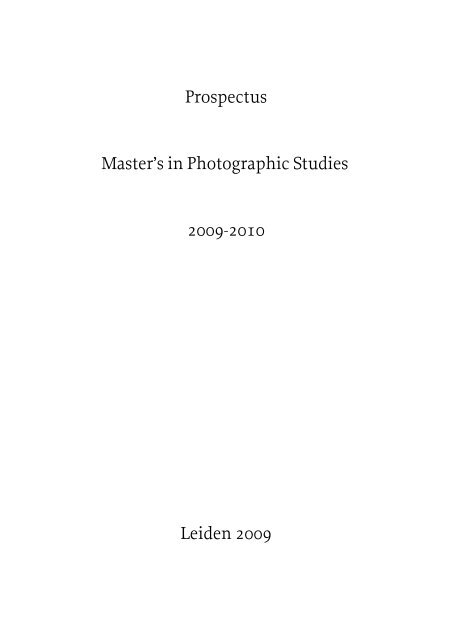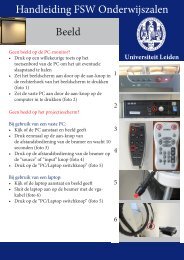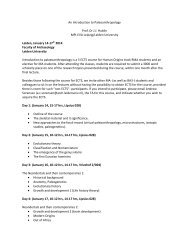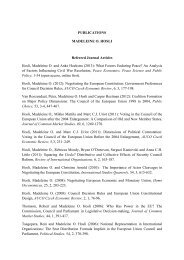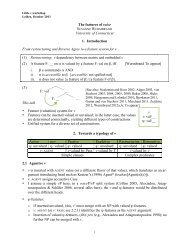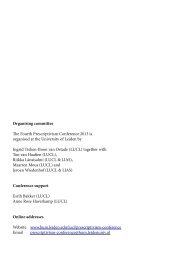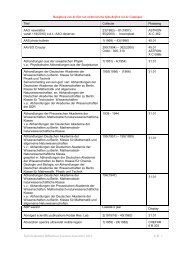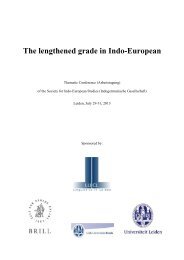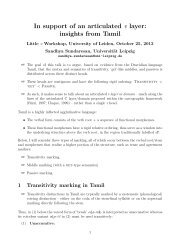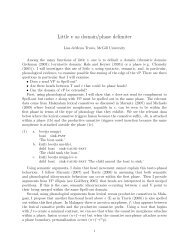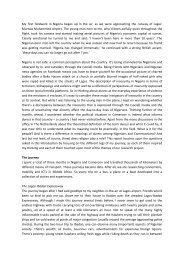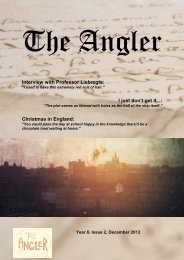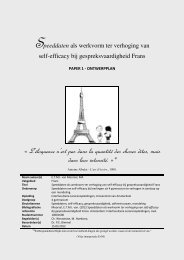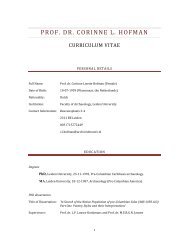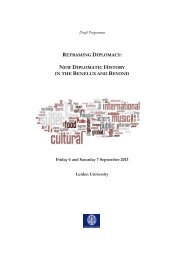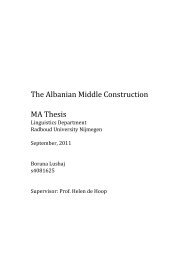Prospectus Master's in Photographic Studies 2009-2010 Leiden 2009
Prospectus Master's in Photographic Studies 2009-2010 Leiden 2009
Prospectus Master's in Photographic Studies 2009-2010 Leiden 2009
You also want an ePaper? Increase the reach of your titles
YUMPU automatically turns print PDFs into web optimized ePapers that Google loves.
<strong>Prospectus</strong><br />
Master’s <strong>in</strong> <strong>Photographic</strong> <strong>Studies</strong><br />
<strong>2009</strong>-<strong>2010</strong><br />
<strong>Leiden</strong> <strong>2009</strong>
Master’s <strong>in</strong> <strong>Photographic</strong> <strong>Studies</strong><br />
Rapenburg 38<br />
2311 EX <strong>Leiden</strong><br />
Post Box 9500<br />
2300 RA <strong>Leiden</strong> | The Netherlands<br />
T 071 527 18 05<br />
F 071 527 18 08<br />
E maps@hum.leidenuniv.nl<br />
I www.photographicstudies.leidenuniv.nl
This prospectus has been prepared with all possible care. However, no legal claims can be<br />
based upon the text. Information subject to change.
Contents<br />
1. Master’s <strong>in</strong> <strong>Photographic</strong> <strong>Studies</strong> 5<br />
1.1 Introduction 5<br />
1.2 The collaborat<strong>in</strong>g partners 5<br />
1.3 Purpose and organisation of the programme 5<br />
2. The programme as organisation 7<br />
2.1 Institutes 7<br />
2.2 Staff of the Master’s <strong>in</strong> <strong>Photographic</strong> <strong>Studies</strong> 8<br />
2.3 Governance 10<br />
2.3.1 Master’s <strong>in</strong> <strong>Photographic</strong> <strong>Studies</strong> (MaPS) 10<br />
2.3.2 Faculty of Humanities 11<br />
2.4 Course and student adm<strong>in</strong>istration 11<br />
3. Course and Exam<strong>in</strong>ation Regulations (OER) and Student Charter 14<br />
4. Admission and achievement levels 15<br />
4.1 Master’s programme 15<br />
4.2 Admission requirements 15<br />
4.3 Achievement levels 16<br />
5. The educational programme 18<br />
5.1 Programme 18<br />
5.2 Electives and <strong>in</strong>ternships 27<br />
5.3 Other activities 31<br />
5.4 The Master’s thesis 31<br />
5.5 Graduation 32<br />
6. Supplementary <strong>in</strong>formation 34<br />
6.1 Libraries <strong>in</strong> <strong>Leiden</strong> 34<br />
6.2 Course-related activities 35<br />
6.3 Important photography <strong>in</strong>stitutions and tra<strong>in</strong><strong>in</strong>g programmes 36<br />
6.4 Recommended read<strong>in</strong>gs for preparation and orientation 37<br />
7. Schedule 39<br />
8. Other sources of <strong>in</strong>formation 40
1. Master’s <strong>in</strong> <strong>Photographic</strong> <strong>Studies</strong><br />
1.1 Introduction<br />
Photography is at the centre of <strong>in</strong>terest today. Photography museums have been<br />
established <strong>in</strong> Rotterdam, The Hague and Amsterdam, and art museums are pay<strong>in</strong>g more<br />
attention to their own photo collections. There are now specialised photography galleries,<br />
and articles on photography regularly appear <strong>in</strong> the art pages of lead<strong>in</strong>g newspapers. As a<br />
result of this <strong>in</strong>creas<strong>in</strong>g attention – both national and <strong>in</strong>ternational – there is a grow<strong>in</strong>g<br />
need for well-tra<strong>in</strong>ed <strong>in</strong>dividuals with specific knowledge who can approach and analyse<br />
photography both as an <strong>in</strong>dependent medium and <strong>in</strong> relation to other discipl<strong>in</strong>es and<br />
media. There is no other programme that focuses so specifically on photography while<br />
ma<strong>in</strong>ta<strong>in</strong><strong>in</strong>g <strong>in</strong>terdiscipl<strong>in</strong>arity, as well as provid<strong>in</strong>g academic (<strong>in</strong>tellectual) and curatorial<br />
(practical) tra<strong>in</strong><strong>in</strong>g, as the Master’s <strong>in</strong> <strong>Photographic</strong> <strong>Studies</strong> at <strong>Leiden</strong> University.<br />
1.2 The collaborat<strong>in</strong>g partners<br />
The Master’s <strong>in</strong> <strong>Photographic</strong> <strong>Studies</strong> is a special programme with<strong>in</strong> the Faculty of<br />
Humanities. A high degree of cross-discipl<strong>in</strong>ary th<strong>in</strong>k<strong>in</strong>g is encouraged furthermore by<br />
close collaboration with the Department of Art History and other departments of <strong>Leiden</strong><br />
University, as well as with the Pr<strong>in</strong>t Room (Prentenkab<strong>in</strong>et)/Division of Special Collections<br />
(University Library), which has an important photography collection, and the Royal<br />
Academy of F<strong>in</strong>e <strong>in</strong> The Hague. This is expressed <strong>in</strong> the educational programme, which<br />
strives for <strong>in</strong>tegration and the exploration of mutual connections between art and science.<br />
1.3 Purpose and organisation of the programme<br />
The Master’s <strong>in</strong> <strong>Photographic</strong> <strong>Studies</strong> aims to give students a broad academic and socially<br />
engaged orientation on photography. Particular areas of attention are the <strong>in</strong>terdiscipl<strong>in</strong>ary<br />
methods of academic study of photography; art historical theories and theories of<br />
photography; the significance of photography as a means of communication and a mass<br />
medium with specific underly<strong>in</strong>g strategies; the <strong>in</strong>terconnections among photography,<br />
visual culture and other forms of visual art; the forms of presentation for photography<br />
(exhibitions, <strong>in</strong>ternet, publications, reviews, etc.); photographic practice as research; and<br />
strategies <strong>in</strong> the field of collect<strong>in</strong>g, conservation and management. As a result of the<br />
<strong>in</strong>creased <strong>in</strong>terest <strong>in</strong> photography and the grow<strong>in</strong>g role that photography plays <strong>in</strong> society,<br />
there are ever more environments (‘photography worlds’) <strong>in</strong> which photography can be<br />
<strong>in</strong>vestigated. Developments such as digital photography and new media will also be dealt<br />
with <strong>in</strong> the programme.<br />
The topics listed above will be addressed dur<strong>in</strong>g lectures, sem<strong>in</strong>ars and as part of<br />
<strong>in</strong>dependent study, based on various types of objects such as photographs and<br />
photographic objects; historic and contemporary photographic sources; the history of<br />
5
photography and photo criticism. The outcome of this study will be reflected <strong>in</strong> term<br />
papers and other written projects, discussions, case studies, portfolios, exhibition and<br />
website proposals, and photo-historical essays.<br />
This foundation of knowledge, skills and <strong>in</strong>sight will enable the student to formulate and<br />
seek answers to new questions, and to function with academic <strong>in</strong>tegrity with<strong>in</strong> the<br />
professional field (for <strong>in</strong>stance as a photo historian, curator, photographer, visual historian,<br />
critic, photo agency manager, picture editor, or exhibition maker).<br />
6
2. The programme as organisation<br />
2.1 Institutes<br />
Master’s <strong>in</strong> <strong>Photographic</strong> <strong>Studies</strong><br />
Faculty of Humanities<br />
Rapenburg 38, 2311 EX <strong>Leiden</strong><br />
Post Box 9500, 2300 RA <strong>Leiden</strong><br />
Study coord<strong>in</strong>ator: t.b.a.<br />
Secretariat: Marijke Hamel<br />
Telephone: +31 (0)71 527 18 05, e-mail: maps@hum.leidenuniv.nl<br />
Hours: Monday through Friday, 9:00 a.m.-2:00 p.m.<br />
Internet: www.artsandsciences.nl<br />
Department of Art History<br />
Dr. Kitty Zijlmans (Professor of modern visual art and photography)<br />
Doelensteeg 16, 2311 VL <strong>Leiden</strong> (room: 1174-214)<br />
Telephone: +31 (0)71 527 26 48, e-mail: c.j.m.zijlmans@hum.leidenuniv.nl and<br />
secrkg@hum.leidenuniv.nl<br />
Internet: www.kunstgeschiedenis.leidenuniv.nl<br />
Royal Academy of F<strong>in</strong>e Arts<br />
Pr<strong>in</strong>sessegracht 4, 2514 AN The Hague<br />
Telephone: +31 (0)70 315 47 77<br />
Internet: www.kabk.nl<br />
Pr<strong>in</strong>t Room (Prentenkab<strong>in</strong>et)/Division of Special Collections, University Library<br />
Maartje van den Heuvel MA (Curator of the photography collection)<br />
Telephone: +31 (0)71 527 27 92, e-mail: m.e.n.van.den.heuvel@library.leidenuniv.nl<br />
Joke Pronk (assistant curator)<br />
Telephone: +31 (0)71 527 27 95, e-mail: j.pronk@library.leidenuniv.nl<br />
Witte S<strong>in</strong>gel 27, 2311 BG <strong>Leiden</strong><br />
Internet: www.ub.leidenuniv.nl (> Bijzondere Collecties)<br />
2.2 Staff of the Master’s <strong>in</strong> <strong>Photographic</strong> <strong>Studies</strong><br />
- Prof. Dr. Susan Meiselas<br />
Professor <strong>in</strong> Photography<br />
256 Mott Street<br />
NY 10012 New York, USA<br />
E-mail: susan@susanmeiselas.com<br />
7
Susan Meiselas received her Master’s <strong>in</strong> Visual Education from Harvard University (USA)<br />
<strong>in</strong> 1971. Her first photo book, Carnival Strippers, appeared <strong>in</strong> 1976. She became a member<br />
of the photographers’ collective Magnum Photos <strong>in</strong> that same year, and has worked as a<br />
freelance photographer s<strong>in</strong>ce then. She is well known for her photographs of the<br />
Nicaraguan <strong>in</strong>surrection, her documentation of human rights issues <strong>in</strong> Lat<strong>in</strong> America, and<br />
her projects Kurdistan: In the Shadow of History (1997, repr<strong>in</strong>ted 2008) and Encounters<br />
with the Dani (2003). In addition to her work as an editor and her contributions to<br />
numerous photo books, Meiselas has had various solo exhibitions <strong>in</strong> Rotterdam, Paris,<br />
Madrid, Amsterdam, Los Angeles, London, Chicago and New York. She has taught at the<br />
University of California, Berkeley and has received two honorary doctorates. Her<br />
photographs are <strong>in</strong>cluded <strong>in</strong> several <strong>in</strong>ternational collections and she has received a<br />
number of renowned prizes. Her chair at <strong>Leiden</strong> is sponsored by the Nederlands<br />
Fotomuseum <strong>in</strong> Rotterdam.<br />
- Dr. Rachel Esner<br />
Lecturer <strong>in</strong> Photography<br />
Chair of the Master’s <strong>in</strong> <strong>Photographic</strong> <strong>Studies</strong><br />
Rapenburg 38, 2311 EX <strong>Leiden</strong><br />
Telephone: +31 (0)71 527 30 35/18 05<br />
Email: r.esner@hum.leidenuniv.nl<br />
Rachel Esner is an art historian lectur<strong>in</strong>g <strong>in</strong> modern art and the history of photography. Her<br />
<strong>in</strong>terests focus on the history and theory of documentary photography from the<br />
n<strong>in</strong>eteenth century to today, on questions of the relationship between photography and<br />
art, and on issues of the <strong>in</strong>stitutionalization of photography through museum and<br />
curatorial practice.<br />
- T<strong>in</strong>eke de Ruiter, MA<br />
Lecturer <strong>in</strong> Photography and Applied Arts<br />
Doelensteeg 16, 2311 VL <strong>Leiden</strong> (room: 1174-220b)<br />
Telephone: +31 (0)71 527 27 52<br />
Email: m.a.de.ruiter@hum.leidenuniv.nl<br />
T<strong>in</strong>eke de Ruiter is an art historian and is affiliated with the Department of Art History and<br />
the Master’s <strong>in</strong> <strong>Photographic</strong> <strong>Studies</strong> as a lecturer <strong>in</strong> Modern Visual Arts and Photography.<br />
She is research<strong>in</strong>g the photographic oeuvre of the pa<strong>in</strong>ter George Hendrik Breitner. De<br />
Ruiter is a board member of the Sticht<strong>in</strong>g Fonds Anna Cornelis (chair) as well as FOAM,<br />
Amsterdam.<br />
- Bas Vroege<br />
Coord<strong>in</strong>ator Curatorial Tra<strong>in</strong><strong>in</strong>g Programme<br />
KABK, Pr<strong>in</strong>sessegracht 4, 2514 AN The Hague<br />
Telephone: +31 (0)70 315 47 77/(0)299 31 50 83<br />
Email: bv@paradox.nl<br />
Bas Vroege studied economics at Erasmus University Rotterdam and photography at St.<br />
Joost Academy <strong>in</strong> Breda. From 1981-1993 he was director of Perspektief, centre for<br />
8
photography <strong>in</strong> Rotterdam and the Fotografie Biënnale Rotterdam (1988-1992). S<strong>in</strong>ce 1993<br />
he is director of Paradox, which produces photography-related projects driven by a social<br />
agenda. As a curator, Bas Vroege has been responsible for a number of cross-media festivals<br />
and exhibitions. As an advisor he has worked for several <strong>in</strong>stitutions such as the<br />
Mondriaan Foundation (1993-1995) and the MFA photography programme at St. Joost<br />
Academy <strong>in</strong> Breda (1999-2002). He is a member of the Supervisory Board of World Press<br />
Photo, Amsterdam, and member of the Advisory Board of Three Shadows Photography Art<br />
Centre, Beij<strong>in</strong>g. He has recently taken up photography aga<strong>in</strong> and is currently work<strong>in</strong>g on<br />
the collaborative project Oswiecim Now, deal<strong>in</strong>g with the post-war period of the Polish<br />
town of Oswiecim (Auschwitz), to be published early <strong>2010</strong>.<br />
- Dr. Helen Westgeest<br />
Lecturer <strong>in</strong> Modern Visual Art and Photography<br />
Doelensteeg 16, 2311 VL <strong>Leiden</strong> (room: 1174-215a)<br />
Telephone: +31 (0)71 527 27 44<br />
Email: h.f.westgeest@hum.leidenuniv.nl<br />
Helen Westgeest is an art historian and is affiliated with the Department of Art History and<br />
the Master’s <strong>in</strong> <strong>Photographic</strong> <strong>Studies</strong> as a lecturer <strong>in</strong> Modern and Contemporary Art<br />
History and Theories of Photography. S<strong>in</strong>ce receiv<strong>in</strong>g her doctorate <strong>in</strong> 1996 her<br />
<strong>in</strong>vestigations have shifted via the work of the Japanese photographer Miyamoto Ryuji to<br />
the theory of photography and especially the role and nature of photography <strong>in</strong><br />
multimedia works of art. She participates <strong>in</strong> several <strong>in</strong>ternational research projects. She has<br />
(co-)edited and contributed to numerous publications on photography, <strong>in</strong>clud<strong>in</strong>g<br />
Photography between Poetry and Politics (2008); Take Place. Photography and the Concept<br />
of Place from a Multimedial Perspective (<strong>2009</strong>); and The <strong>Photographic</strong> Medium <strong>in</strong><br />
Contemporary Art. Theories <strong>in</strong> Historical Perspective (forthcom<strong>in</strong>g <strong>2010</strong>).<br />
Study coord<strong>in</strong>ator: t.b.a.<br />
Rapenburg 38, 2311 EX <strong>Leiden</strong><br />
Telephone: +31 (0)71 527 18 05<br />
Email: maps@hum.leidenuniv.nl<br />
2.3 Governance<br />
2.3.1 Master’s <strong>in</strong> <strong>Photographic</strong> <strong>Studies</strong> (MaPS)<br />
The Master’s <strong>in</strong> <strong>Photographic</strong> <strong>Studies</strong> is part of the Faculty of Humanities. The department<br />
has a Departmental Adm<strong>in</strong>istration (OLB) of three members, one of whom is a student. In<br />
addition there is also an admissions committee, an exam<strong>in</strong>ation committee and a teach<strong>in</strong>g<br />
committee (OLC).<br />
Departmental Adm<strong>in</strong>istration (OLB)<br />
The Departmental Adm<strong>in</strong>istration is charged with the organisation of the department’s<br />
educational programme and is responsible for the smooth operation of the department <strong>in</strong><br />
9
general. The chairman is named by the Faculty Board; the Departmental Adm<strong>in</strong>istration<br />
chooses a secretary from its own members.<br />
Chairperson: Dr. Rachel Esner.<br />
Member from academic staff: Dr. Helen Westgeest.<br />
Student member: changes annually.<br />
Admissions committee<br />
The admissions committee is concerned with the admission of students. Members of the<br />
academic staff: Dr. Rachel Esner, T<strong>in</strong>eke de Ruiter, MA, Bas Vroege, Dr. Helen Westgeest.<br />
Advisory member: Study coord<strong>in</strong>ator, t.b.a.<br />
Exam<strong>in</strong>ation committee<br />
The exam<strong>in</strong>ation committee is charged with organis<strong>in</strong>g prelim<strong>in</strong>ary and f<strong>in</strong>al<br />
exam<strong>in</strong>ations. In addition the committee handles compla<strong>in</strong>ts about prelim<strong>in</strong>ary<br />
exam<strong>in</strong>ations and other requests from students (regulations, exemptions, etc.). All the<br />
lecturers <strong>in</strong>volved <strong>in</strong> the department are part of the exam<strong>in</strong>ation committee.<br />
Members from the academic staff: Dr. Rachel Esner, T<strong>in</strong>eke de Ruiter, MA, Bas Vroege, Dr.<br />
Helen Westgeest.<br />
Advisory member: Study coord<strong>in</strong>ator, t.b.a.<br />
Teach<strong>in</strong>g committee (OLC)<br />
For students, the OLC, half of which is composed of students, is the most important<br />
advisory body. Through the OLC they can exercise <strong>in</strong>fluence on all aspects of the<br />
educational process, such as implementation, structure, evaluation, etc. Constructive<br />
criticism and compla<strong>in</strong>ts brought to the OLC can lead to the requisite improvements. The<br />
student members of the OLC are elected for one year. Their term of office runs from<br />
October 15 th through October 14 th the follow<strong>in</strong>g year. Students may both run and vote <strong>in</strong><br />
the elections.<br />
The committee has four members: a maximum of two staff members and a maximum of<br />
two student members.<br />
Members from the academic staff: Dr. Rachel Esner and T<strong>in</strong>eke de Ruiter MA.<br />
Student members: membership changes annually (October 15 th to October 14 th ).<br />
Advisory member: Study coord<strong>in</strong>ator, t.b.a.<br />
2.3.2 Faculty of Humanities<br />
Faculty board<br />
The board of the Faculty of Humanities is responsible for the general direction of the<br />
programme. The faculty board is comprised of Prof. Dr. Wim van den Doel, Dr. Arie<br />
Verhagen, Jolanda Riel, MA, and a student member (changes annually). The secretary of the<br />
board is Sander Bos, MA.<br />
The student member can be reached by e-mail at: assessor@hum.leidenuniv.nl.<br />
2.4 Course and student adm<strong>in</strong>istration<br />
10
Credits<br />
The study load is expressed with the aid of the European Credit Transfer System (ECTS). At<br />
all universities students receive ECTS for successfully complet<strong>in</strong>g courses <strong>in</strong> the<br />
programme of studies.<br />
Study load<br />
Students devote 42 weeks per year to their studies, at forty hours per week. A study year<br />
thus comes to 1680 study hours, which equals 60 ECTS. One ECTS represents 28 study-load<br />
hours. For a course of 10 ECTS, a full time student will work for seven weeks of 40 hours<br />
per week, prepar<strong>in</strong>g for and participat<strong>in</strong>g <strong>in</strong> sem<strong>in</strong>ars, read<strong>in</strong>g literature, ga<strong>in</strong><strong>in</strong>g workstudy<br />
experience or prepar<strong>in</strong>g assignments, and study<strong>in</strong>g for tests. The preparation time<br />
per contact hour for a formal lecture is one hour per contact hour, for a sem<strong>in</strong>ar two hours<br />
per contact hour. A student is assumed to study 5-15 pages of specialist literature per hour,<br />
depend<strong>in</strong>g on its difficulty; thus 28 hours of study load, or 1 ECTS, is about 140-300 pages of<br />
specialist literature.<br />
Test<strong>in</strong>g<br />
The student’s knowledge will be tested by means of <strong>in</strong>-class or take-home exams, written<br />
papers, practical assignments and term papers.<br />
Records of test results<br />
All study results are <strong>in</strong>cluded <strong>in</strong> the computerised study progress registration system ISIS/<br />
S&S. The department makes use of a number of fixed subject codes that correspond to the<br />
classes completed. Students can view their results via U-Twist: www.ulcn.leidenuniv.nl.<br />
Papers and other written assignments are dated on the day that the <strong>in</strong>structors or thesis<br />
supervisors award the grade. Instructors are required to perform their corrections <strong>in</strong> a<br />
timely manner (with<strong>in</strong> fifteen workdays) and pass the results on directly to the office of the<br />
secretary. Until thirty days after announcement of the result of the written exams students<br />
can see judged work at their request.<br />
Students who take electives at other Dutch or foreign universities as part of their Master’s<br />
(only with the approval of the Exam<strong>in</strong>ation committee) should request their marks<br />
themselves and forward these as quickly as possible to the secretariat of the Master’s <strong>in</strong><br />
<strong>Photographic</strong> <strong>Studies</strong>.<br />
Blackboard<br />
The Master’s <strong>in</strong> <strong>Photographic</strong> <strong>Studies</strong> makes use of the electronic learn<strong>in</strong>g environment<br />
Blackboard. Students and <strong>in</strong>structors can communicate with one another through this<br />
platform, via the <strong>in</strong>ternet. The home page for Blackboard is:<br />
www.blackboard.leidenuniv.nl. The Study coord<strong>in</strong>ator of the Master’s programme reports<br />
the identity of all students and lecturers <strong>in</strong>volved to Blackboard, and with the use of a<br />
password students can visit the website. The use of Blackboard will differ from one part of<br />
the programme to another and depends on the <strong>in</strong>structor <strong>in</strong>volved and the subject matter.<br />
U-mail<br />
E-mail correspondence among <strong>in</strong>structors, the Study coord<strong>in</strong>ator and students takes place<br />
via U-mail. Each student at <strong>Leiden</strong> University has an U-mail account, consist<strong>in</strong>g of their<br />
own <strong>in</strong>itials and last name, followed by @umail.leidenuniv.nl. On the home page,<br />
www.ulcn.leidenuniv.nl, you can forward your U-mail on to your own e-mail address via<br />
11
mailforward<strong>in</strong>g. Please note: staff and <strong>in</strong>structors will only communicate with you<br />
through U-mail. No private addresses will be used.<br />
Student obligation<br />
In case of a structural set-back <strong>in</strong> health or because of other special personal circumstances,<br />
a student has the obligation to <strong>in</strong>form the Study coord<strong>in</strong>ator.<br />
Costs <strong>2009</strong>-<strong>2010</strong><br />
Tuition Fees for Dutch, EU/EEA, Swiss and Sur<strong>in</strong>amese nationals:<br />
statutory tuition fees for students aged under 30: € 1.620,- (<strong>2009</strong>-<strong>2010</strong>)<br />
<strong>in</strong>stitutional fee for students aged 30 and over: circa € 2.150,- (<strong>2009</strong>-<strong>2010</strong>).<br />
Tuition Fees for International Students who are not from EU/EEA/Switzerland/Sur<strong>in</strong>am:<br />
€ 13,750 p/y (<strong>2009</strong>-<strong>2010</strong>).<br />
Statutory tuition fees<br />
* The Dutch M<strong>in</strong>istry of Education regulates the tuition fees for Dutch students under the<br />
age of 30 for all programmes that have been approved for government fund<strong>in</strong>g. Under<br />
Dutch law the age of the student on September 1 st (start of the academic year) determ<strong>in</strong>es<br />
the fee to be paid by the student for that academic year. A student who reaches the age of<br />
30 on September 1 st (<strong>2009</strong>) is required to pay the amount of (circa) € 2.150,- for the<br />
academic year <strong>2009</strong>-<strong>2010</strong>.<br />
Other costs<br />
- Costs of the admission package (conta<strong>in</strong><strong>in</strong>g 2 CD-ROMS with assignments): € 49, 95.<br />
- Costs of material(s) for the practical part of the programme (e.g. workshops with Susan<br />
Meiselas): € 30,- to € 70,-. This amount <strong>in</strong>cludes a facility card of the Royal Academy of F<strong>in</strong>e<br />
Arts to borrow a camera (without memory card!), laptop or other materials at the Uitleen<br />
or to make photocopies.<br />
Books and other study materials: € 250,- to € 300,-.<br />
12
3. Course and Exam<strong>in</strong>ation Regulations (OER) and Student Charter<br />
Every course of study has a Course and Exam<strong>in</strong>ation Regulations (an OER) that is drawn up<br />
for it <strong>in</strong> accordance with Article 7.13 of the Higher Education and Scientific Research Act<br />
(WHW). Among the issues described <strong>in</strong> it are the purpose and achievement levels of the<br />
course, the educational programme, the regulations surround<strong>in</strong>g tests and f<strong>in</strong>al<br />
exam<strong>in</strong>ations, admission requirements and the supervision for students. In the appendices<br />
to the OER one also f<strong>in</strong>ds the rules govern<strong>in</strong>g the Master’s thesis, exam<strong>in</strong>ation results and<br />
honours, evaluation, etc. The Course and Exam<strong>in</strong>ation Regulations for the course of study<br />
can be found at www.artsandsciences.nl.<br />
The Student Charter <strong>in</strong>forms students at <strong>Leiden</strong> of what they can expect from the<br />
University and what the University expects of them. This Charter is essentially a collection<br />
of all the rights and obligations of students, but also <strong>in</strong>dicates what University facilities<br />
there are for students. Moreover, it <strong>in</strong>cludes a summary of the legal protections students<br />
enjoy.<br />
Organisation of the charter<br />
The Charter consists of two parts. The <strong>in</strong>stitutional part, which is the same for every<br />
student, is found on www.studentenstatuut.leidenuniv.nl. The departmental section,<br />
which is <strong>in</strong>tended for students <strong>in</strong> a particular course of study, is published on the website.<br />
Scope<br />
The Student Charter applies exclusively to students at <strong>Leiden</strong> University.<br />
Relation with the WHW and University regulations<br />
This Charter is the Student Charter as <strong>in</strong>tended <strong>in</strong> Art. 7.59 of the Higher Education and<br />
Scientific Research Act (WHW).<br />
The University is obligated to carry out the provisions of the Student Charter. To an extent,<br />
it lists rights and obligations that are stipulated by law. An overview of the relevant legal<br />
and University regulations can be found <strong>in</strong> the first chapter. The University regulations are<br />
also available for exam<strong>in</strong>ation at the Plexus Informatie Trefpunt Studenten (PITSstop) <strong>in</strong><br />
the Student Information Centre.<br />
If necessary, compliance to the regulations can be enforced by compla<strong>in</strong>t and appeals<br />
procedures.<br />
PITSstop<br />
Student Centre Plexus<br />
Kaiserstraat 25, <strong>Leiden</strong><br />
Telephone: +31 (0)71 527 80 25, e-mail: pitsstop@plexus.leidenuniv.nl<br />
Internet: www.pitsstop.leidenuniv.nl.<br />
13
4. Admission and achievement levels<br />
4.1 Master’s programme<br />
As a result of their methodological foundation <strong>in</strong> a particular branch of knowledge and<br />
anchorage <strong>in</strong> academic research, Master’s programmes have an academic character. A<br />
Master’s can be broad or highly specialised <strong>in</strong> nature. However, <strong>in</strong> terms of the end level it<br />
br<strong>in</strong>gs the student to the forefront of his or her field. This implies that the student will be<br />
acqua<strong>in</strong>ted with the latest advances <strong>in</strong> scholarly th<strong>in</strong>k<strong>in</strong>g.<br />
The Master’s <strong>in</strong> <strong>Photographic</strong> <strong>Studies</strong> comb<strong>in</strong>es this academic orientation with<br />
professional practice. The title obta<strong>in</strong>ed upon its completion is that of Master’s <strong>in</strong><br />
<strong>Photographic</strong> <strong>Studies</strong>: Master of Arts (MA), with, as the specialised field, <strong>Photographic</strong><br />
<strong>Studies</strong>. On the basis of the completed Master’s course, the student can qualify for a<br />
doctoral programme. The <strong>in</strong>structors can provide more <strong>in</strong>formation on this.<br />
4.2 Admission requirements<br />
A bachelor’s degree <strong>in</strong> art history, cultural studies, visual anthropology, media studies or a<br />
related academic discipl<strong>in</strong>e or a degree from an arts academy (BFA or MFA) is required <strong>in</strong><br />
order to be considered for the programme. See also:<br />
http://www.postgraduate.leidenuniv.nl/admissions/<br />
It is expected of aspir<strong>in</strong>g students that they have <strong>in</strong>sight <strong>in</strong>to the medium, that they are<br />
able to deal with <strong>in</strong>formation <strong>in</strong> a scholarly manner, and that they have some personal<br />
experience with photography. For the admission procedure candidates must do the<br />
follow<strong>in</strong>g:<br />
1. submit a CV and a letter expla<strong>in</strong><strong>in</strong>g their motivation and reasons for wish<strong>in</strong>g to jo<strong>in</strong> the<br />
Master’s programme;<br />
2. write an essay based on a reader with academic articles on photography assembled by<br />
the lecturers <strong>in</strong> the Master’s <strong>in</strong> <strong>Photographic</strong> <strong>Studies</strong> programme so that the<br />
Admissions committee can assess whether the aspir<strong>in</strong>g student has achieved an<br />
adequate academic level;<br />
3. choose from a CD-ROM file of over n<strong>in</strong>ety photographs and assemble a photographic<br />
visual account accord<strong>in</strong>g to his or her own <strong>in</strong>sights. The selection should be<br />
accompanied by a short written justification expla<strong>in</strong><strong>in</strong>g the criteria that were employed<br />
<strong>in</strong> the process.<br />
On the basis of the application materials students may be selected for an <strong>in</strong>terview. This<br />
<strong>in</strong>terview represents a cont<strong>in</strong>uation of the application process; if you are not <strong>in</strong>vited, your<br />
application has been rejected. F<strong>in</strong>al admission is based on the quality of the essay and<br />
photo selection, and the <strong>in</strong>terview with the admission committee, <strong>in</strong> which the aspir<strong>in</strong>g<br />
student also presents the visual account he or she put together. Interviews will be held <strong>in</strong><br />
March, June and August <strong>2009</strong>.<br />
14
Please note that it is possible to start the MA programme <strong>in</strong> February as well as September.<br />
Should you choose to beg<strong>in</strong> <strong>in</strong> February, please contact the programme chair, Dr. Rachel<br />
Esner, at an early stage, as a special programme will have to be developed for you.<br />
4.3 Achievement levels<br />
The Master’s <strong>in</strong> <strong>Photographic</strong> <strong>Studies</strong> has the follow<strong>in</strong>g objectives:<br />
- broaden<strong>in</strong>g and deepen<strong>in</strong>g of knowledge, <strong>in</strong>sight, skills and use of methodology <strong>in</strong> the<br />
area of <strong>Photographic</strong> <strong>Studies</strong>;<br />
- furtherance of academic and professional tra<strong>in</strong><strong>in</strong>g;<br />
- preparation for an academic career and/or post-graduate education;<br />
- preparation for a professional career as a photo historian, visual historian, curator,<br />
critic, photographer, photo agency manager, editor or exhibition maker.<br />
The follow<strong>in</strong>g achievement levels apply with regard to the Master’s <strong>in</strong> <strong>Photographic</strong><br />
<strong>Studies</strong>:<br />
The Master <strong>in</strong> <strong>Photographic</strong> <strong>Studies</strong> has ga<strong>in</strong>ed knowledge of and <strong>in</strong>sight <strong>in</strong>to:<br />
- the contextualization and pr<strong>in</strong>ciples of photography as a part of art history, visual<br />
culture, and media studies;<br />
- the analysis and <strong>in</strong>terpretation of form, function and content of artefacts (<strong>in</strong> particular,<br />
photographs, photographic objects) and of the environments <strong>in</strong> which photography is<br />
presented;<br />
- <strong>in</strong>sight <strong>in</strong>to the function of photography, also <strong>in</strong> relation to the transformations <strong>in</strong> art<br />
and culture and the processes of commercialisation, digitisation, and the<br />
<strong>in</strong>stitutionalisation of the medium;<br />
- the social relevance and cultural history of the profession;<br />
- the methodologies and research methods employed <strong>in</strong> the academic study of<br />
photography;<br />
- the methods and evolution of theory <strong>in</strong> the history of photography;<br />
- the history of professionalism and the chang<strong>in</strong>g professional notions on photography,<br />
and the most important theoretical approaches;<br />
- the use and application of methods and theories;<br />
- the methodological position<strong>in</strong>g of one’s own research;<br />
- the materials and techniques used <strong>in</strong> professional photographic practice.<br />
The Master <strong>in</strong> <strong>Photographic</strong> <strong>Studies</strong> possesses the follow<strong>in</strong>g academic and professional<br />
skills:<br />
- is able to visually analyse and, on the basis of academic <strong>in</strong>sights and concepts, able to<br />
describe, arrange and compare photographs, photographic objects and environments<br />
<strong>in</strong> which photography is presented;<br />
- with m<strong>in</strong>imal supervision, is able to <strong>in</strong>dependently plan and carry out a research<br />
project (formulat<strong>in</strong>g a research question, establish<strong>in</strong>g the phases of research, and<br />
assessment);<br />
15
- is able to carry out <strong>in</strong>dependent academic study and to <strong>in</strong>terpret artefacts with the aid<br />
of relevant sources, specialist literature and the language specific to the field; and to<br />
reflect critically on the knowledge and <strong>in</strong>sights <strong>in</strong>corporated <strong>in</strong> this;<br />
- is able to present research results clearly, orally or <strong>in</strong> writ<strong>in</strong>g, with accompany<strong>in</strong>g<br />
argumentation;<br />
- has knowledge of, and is able to work <strong>in</strong>dependently with<strong>in</strong> the art and photohistorical<br />
apparatus, such as libraries, photo and slide collections, archives,<br />
computerised <strong>in</strong>formation systems an other documentation resources;<br />
- has practical experience with photography (both analogue and digital), assembl<strong>in</strong>g<br />
exhibitions, writ<strong>in</strong>g reviews of various forms of photographic expression, writ<strong>in</strong>g up<br />
project proposals for grant requests. This hands-on experience is aimed at achiev<strong>in</strong>g a<br />
real <strong>in</strong>tegration of the historical, theoretical, methodological, museological and medial<br />
thought <strong>in</strong> the field of photographic research.<br />
Summarised <strong>in</strong> general academic achievement levels, the follow<strong>in</strong>g elements elucidate the<br />
academic character of the Master’s programme:<br />
Academic knowledge<br />
The student has <strong>in</strong>sight <strong>in</strong>to the manner <strong>in</strong> which academic knowledge is acquired and is<br />
well <strong>in</strong>formed about most recent advances <strong>in</strong> at least one aspect of the discipl<strong>in</strong>e of<br />
<strong>Photographic</strong> <strong>Studies</strong>, and, on the basis of these <strong>in</strong>sights, has learned the skills for<br />
<strong>in</strong>dependently keep<strong>in</strong>g up with progress <strong>in</strong> this discipl<strong>in</strong>e.<br />
Research methods<br />
Dur<strong>in</strong>g the course of study the student engages <strong>in</strong> exercises <strong>in</strong> scholarly research methods<br />
<strong>in</strong> the field of study <strong>in</strong>volved. The Master’s thesis serves to demonstrate that the student<br />
has mastered the required steps <strong>in</strong> an academic exercise and the application of scholarly<br />
methods <strong>in</strong> the discipl<strong>in</strong>e of <strong>Photographic</strong> <strong>Studies</strong>. That is to say: <strong>in</strong> <strong>in</strong>dependent research<br />
on a sub-problem, he or she can apply the knowledge acquired and the analytical methods<br />
of the discipl<strong>in</strong>e to a question, br<strong>in</strong>g the research to a successful result, and defend the<br />
conclusions.<br />
Academic skills<br />
The student is tra<strong>in</strong>ed <strong>in</strong> academic skills such as analys<strong>in</strong>g complex problems; critically<br />
evaluat<strong>in</strong>g academic publications; carry<strong>in</strong>g out theoretical and empirical research and<br />
report<strong>in</strong>g <strong>in</strong> written form; the oral presentation of research; the extraction and formulation<br />
of research questions; and the generation of new po<strong>in</strong>ts of view <strong>in</strong> exist<strong>in</strong>g discussions.<br />
16
5. The educational programme<br />
5.1 Programme<br />
The educational programme <strong>in</strong> the Master’s <strong>in</strong> <strong>Photographic</strong> <strong>Studies</strong> is divided over two<br />
semesters (see chart).<br />
N.B. Language of <strong>in</strong>struction <strong>in</strong> all courses is English. Students may write their papers,<br />
thesis, etc. <strong>in</strong> English or Dutch.<br />
Course ECTS level<br />
First semester<br />
Workshop 1 P/F 400<br />
(Lecture) Histories and Theories of Photography 5 500<br />
(Sem<strong>in</strong>ar) The Photograph as Document 5 500<br />
(Sem<strong>in</strong>ar) Historiographies of Photography 5 500<br />
(Sem<strong>in</strong>ar) Theories of Photography 5 500<br />
Curatorial Tra<strong>in</strong><strong>in</strong>g Program 9 400<br />
Second semester<br />
Workshop 2 3 400<br />
Critical Writ<strong>in</strong>g 3 400<br />
Elective or <strong>in</strong>ternship or collaborative project 10 400<br />
Thesis 15 600<br />
60<br />
Course code: KPS0901<br />
Title: Workshop 1<br />
Description: The student will ga<strong>in</strong> skills <strong>in</strong> techniques and material used <strong>in</strong><br />
photographic practice. Project based learn<strong>in</strong>g how to describe, select<br />
and sequence photographs and create narrative structures with selfmade<br />
images and found photographs. This production workshop is<br />
about engagement through mak<strong>in</strong>g pictures, edit<strong>in</strong>g and sequenc<strong>in</strong>g<br />
images.<br />
Instructor: Prof. Dr. Susan Meiselas.<br />
Method of Group guidance and <strong>in</strong>dividual supervision.<br />
<strong>in</strong>struction:<br />
Level: 400.<br />
ECTS:<br />
P/F<br />
Study<br />
Depend<strong>in</strong>g on the chosen topic.<br />
17
material:<br />
Exam<strong>in</strong>ation:<br />
Time table:<br />
Information:<br />
A series of sequenced photographs and text or sound fully presented <strong>in</strong><br />
design suitable for projection, publication or presentation <strong>in</strong> an<br />
exhibition space.<br />
Please note that students will be awarded a pass/fail for this class rather<br />
than ECTS.<br />
First term. Start<strong>in</strong>g August 31st (five days <strong>in</strong> total), followed by<br />
reflection on the workshop, discussion and a series of <strong>in</strong>dividual <strong>in</strong>itial<br />
talks on <strong>in</strong>ternship and pre-thesis work <strong>in</strong> the Fall.<br />
Study coord<strong>in</strong>ator, t.b.a.<br />
Telephone: +31 (0)71 527 18 05, e-mail: maps@hum.leidenuniv.nl<br />
Course code: KPS0802<br />
Title:<br />
Histories and Theories of Photography<br />
Description: This series of lectures will provide students with an <strong>in</strong>troduction to the<br />
histories and theories of photography from its <strong>in</strong>vention to today.<br />
Upon completion of this module, students will be able to identify not<br />
only <strong>in</strong>dividual photographers and photographic projects, but also<br />
major issues <strong>in</strong> photography history and theory. Among the questions<br />
addressed will be the photograph as document and the photograph as<br />
art form; photography’s medium specificity and self-reflexivity;<br />
problems of truth and representation; the photograph as object; and<br />
the uses and functions of photography. Students will become aware of<br />
the <strong>in</strong>tr<strong>in</strong>sically <strong>in</strong>terdiscipl<strong>in</strong>ary nature of photography and its<br />
relation to fields such as art, sciences, literature and film.<br />
Instructors: Dr. Rachel Esner; T<strong>in</strong>eke de Ruiter, MA; Dr. Helen Westgeest<br />
Method of Lectures. The course is divided <strong>in</strong>to three blocks of four lectures, each<br />
<strong>in</strong>struction: given by one of the <strong>in</strong>structors: The Photograph as Document (Dr.<br />
Rachel Esner); The Photograph and/as Art (T<strong>in</strong>eke de Ruiter, MA);<br />
Theories of Photography (Dr. Helen Westgeest).<br />
Level: 500.<br />
ECTS:<br />
5 ECTS.<br />
Study<br />
- Mary Warner Marien, Photography: A Cultural History,.2nd ed.,<br />
material: Upper Saddle River, New York: Pearson Prentice Hall 2006.<br />
- Alan Trachtenberg, Classic Essays on Photography. New Haven, Conn:<br />
Leet’s Island Books 1981.<br />
- Purchased reader<br />
Exam<strong>in</strong>ation: F<strong>in</strong>al (<strong>in</strong>-class) exam.<br />
Time table: First term. Classes will beg<strong>in</strong> on 8 September and run until 15<br />
December (11 a.m. – 1 p.m.). Room to be announced.<br />
Information: Dr. Rachel Esner, telephone: +31 (0) 71 527 30 35, e-mail:<br />
r.esner@hum.leidenuniv.nl<br />
Course code:<br />
Title:<br />
Content:<br />
KPS0805<br />
The Photograph as Document<br />
Each of the four sem<strong>in</strong>ar meet<strong>in</strong>gs will look closely at one aspect<br />
treated <strong>in</strong> the lecture series Histories and Theories of Photography<br />
(Course code: KPS0802). The focus of this sem<strong>in</strong>ar will be the role of<br />
18
Instructor:<br />
Method of<br />
<strong>in</strong>struction:<br />
Level: 500.<br />
ECTS:<br />
Study<br />
material:<br />
Exam<strong>in</strong>ation:<br />
Time table:<br />
Information:<br />
photography <strong>in</strong> the formation and ma<strong>in</strong>tenance of ideologies and<br />
power relations, the function of photography, and issues of<br />
representation, the media and the archive.<br />
Dr. Rachel Esner<br />
Sem<strong>in</strong>ar.<br />
5 ECTS.<br />
- Purchased reader<br />
Written and/or oral <strong>in</strong>terim assignments, f<strong>in</strong>al assignment. For the<br />
assignments and specific <strong>in</strong>structions see the syllabus supplied by the<br />
<strong>in</strong>structor.<br />
8 September-29 September (2:00-4:00 p.m.). Pr<strong>in</strong>t Room<br />
(Prentenkab<strong>in</strong>et), University Library.<br />
Dr. Rachel Esner, telephone: +31 (0) 71 527 30 35, e-mail:<br />
r.esner@hum.leidenuniv.nl<br />
Course code: KPS0803<br />
Title:<br />
Historiographies of Photography<br />
Content: Each of the four sem<strong>in</strong>ar meet<strong>in</strong>gs will look closely at one aspect<br />
treated <strong>in</strong> the lecture series Histories and Theories of Photography<br />
(Course code: KPS0802). The focus of this sem<strong>in</strong>ar will be the orig<strong>in</strong>s<br />
and development of the historiography of photography. Students will<br />
become acqua<strong>in</strong>ted with the most important historiographic<br />
approaches to photography.<br />
Instructor: T<strong>in</strong>eke de Ruiter, MA<br />
Method of Sem<strong>in</strong>ar.<br />
<strong>in</strong>struction:<br />
Level: 500.<br />
ECTS:<br />
5 ECTS.<br />
- Purchased reader<br />
Study<br />
material:<br />
Exam<strong>in</strong>ation:<br />
Time table:<br />
Information:<br />
Written and/or oral <strong>in</strong>terim assignments, f<strong>in</strong>al assignment. For the<br />
assignments and specific <strong>in</strong>structions see the syllabus supplied by the<br />
<strong>in</strong>structor.<br />
13 October-10 November (2:00-4:00 p.m.). Pr<strong>in</strong>t Room (Prentenkab<strong>in</strong>et),<br />
University Library.<br />
T<strong>in</strong>eke de Ruiter, MA, telephone: +31(0)71 527 27 52, e-mail:<br />
m.a.de.ruiter@hum.leidenuniv.nl.<br />
Course code:<br />
Title:<br />
Content:<br />
KPS0804<br />
Theories of photography<br />
The four sem<strong>in</strong>ar sessions will deal more <strong>in</strong>-depth with the texts<br />
discussed <strong>in</strong> the lecture series Histories and Theories of Photography<br />
(Course code: KPS0802). On the basis of these texts, research questions<br />
will be formulated by the participants <strong>in</strong> order to ga<strong>in</strong> practice <strong>in</strong> the<br />
use of texts and theories as research tools and material.<br />
19
Instructor: Dr. Helen Westgeest<br />
Method of Sem<strong>in</strong>ar.<br />
<strong>in</strong>struction:<br />
Level: 500.<br />
ECTS:<br />
5 ECTS.<br />
- Purchased reader<br />
Study<br />
material:<br />
Exam<strong>in</strong>ation:<br />
Time table:<br />
Information:<br />
Written and/or oral <strong>in</strong>terim assignments, f<strong>in</strong>al assignment. For the<br />
assignments and specific <strong>in</strong>structions see the syllabus supplied by the<br />
<strong>in</strong>structor.<br />
24 November-15 December (2:00-4:00 p.m.). Pr<strong>in</strong>t Room<br />
(Prentenkab<strong>in</strong>et), University Library.<br />
Dr. Helen Westgeest, telephone: +31 (0) 71 527 27 44, e-mail:<br />
h.f.westgeest@hum.leidenuniv.nl.<br />
Course code: KPS0806<br />
Title:<br />
Curatorial Tra<strong>in</strong><strong>in</strong>g Programme<br />
Content: The Curatorial Tra<strong>in</strong><strong>in</strong>g Programme (CTP) <strong>in</strong>troduces students to the<br />
current practice of museum curators and exhibition makers <strong>in</strong> the field<br />
of photography. Meet<strong>in</strong>gs with photographers, curators, designers and<br />
funders will provide <strong>in</strong>sight <strong>in</strong>to diverse aspects of curatorial work <strong>in</strong> a<br />
variety of platforms and media (museums, <strong>in</strong>ternet, book production).<br />
Practical knowledge will be ga<strong>in</strong>ed through <strong>in</strong>terim projects and<br />
assignments focus<strong>in</strong>g on the curator’s many but <strong>in</strong>tegrated tasks.<br />
Instructors: Bas Vroege<br />
Method of Sem<strong>in</strong>ar and practicum.<br />
<strong>in</strong>struction:<br />
Level: 400.<br />
ECTS:<br />
9 ECTS.<br />
Study<br />
- Henk van Os , ‘Slechts drie maanden de Nachtwacht. De hamster, de<br />
material: exhibitionist, de demonstrator, de smaakbevestiger en de vertoner: een<br />
typologie van de makers van tentoonstell<strong>in</strong>gen voor musea’, <strong>in</strong>: De<br />
Groene Amsterdammer, November 26, 2004 (http://www.groene.nl/<br />
2004/0448/hvo_essay.html).<br />
- Bas Vroege, ‘The future of photography – the future looks bright / the<br />
future looks cumbersome’, <strong>in</strong>: Roberta Valtorta (ed.), È contemporanea<br />
la fotografia? Milan: Museo di Fotografia Contemporanea, 2004<br />
(http://paradox.nl/maps/futureofphotography.pdf).<br />
- Mary Anne Staniszewski, The power of display. A history of<br />
exhibition <strong>in</strong>stallations at the Museum of Modern Art, Cambridge:<br />
MIT Press, 1998. (Chapters 1, 2 & 4).<br />
- Additional literature: to be announced.<br />
Exam<strong>in</strong>ation: Analysis of photographers’ portfolios and recommendations for<br />
presentation (4 ECTS); presentation of a project for which the<br />
Mondriaan Foundation’s grant conditions and procedures will be taken<br />
as the guidel<strong>in</strong>es. The course requirements are fulfilled by a<br />
presentation of the project (both orally and <strong>in</strong> written form), comprised<br />
of a comprehensive description of the project, worked out to <strong>in</strong>clude<br />
20
Time table:<br />
Information:<br />
the presentation platforms (5 ECTS).<br />
First term. First sem<strong>in</strong>ar: Wednesday, September 9 th (10:oo-12:30 a.m.,<br />
2:00-4:30 p.m.) at the build<strong>in</strong>g of the Royal Academy of F<strong>in</strong>e Arts,<br />
Pr<strong>in</strong>sessegracht 4, The Hague.<br />
Bas Vroege, e-mail: bv@paradox.nl.<br />
Course code: KPS0808<br />
Title:<br />
Critical writ<strong>in</strong>g<br />
Content: The writ<strong>in</strong>g of short notices and reviews of current events and issues<br />
(exhibitions, festivals, discussions, policy) and publications (photo<br />
books, websites). Articles, journalistic <strong>in</strong> nature, with the <strong>in</strong>tention of<br />
shap<strong>in</strong>g the op<strong>in</strong>ions of a specific audience, are discussed <strong>in</strong> <strong>in</strong>dividual<br />
and group sett<strong>in</strong>gs.<br />
Instructor: Dr. Rachel Esner<br />
Method of Sem<strong>in</strong>ar.<br />
<strong>in</strong>struction:<br />
Level: 400.<br />
ECTS:<br />
3 ECTS.<br />
Study<br />
To be announced<br />
material:<br />
Exam<strong>in</strong>ation: The f<strong>in</strong>al mark is based on the results of the <strong>in</strong>dividual written<br />
assignments.<br />
Time table: Second term. First meet<strong>in</strong>g: Tuesday, February 9 th <strong>2010</strong> (10:00 a.m.-<br />
13:00 p.m.) at the Pr<strong>in</strong>t Room (Prentenkab<strong>in</strong>et), University Library.<br />
Information: Dr. Rachel Esner, telephone: +31 (0) 71 527 30 35, e-mail:<br />
r.esner@hum.leidenuniv.nl.<br />
Course code: KPS0902<br />
Title:<br />
Workshop 2<br />
Content: Project-based learn<strong>in</strong>g. Students prepare a concept, content and model<br />
based on photographic documentation, either orig<strong>in</strong>ated or archival.<br />
Encourag<strong>in</strong>g cross discipl<strong>in</strong>e th<strong>in</strong>k<strong>in</strong>g, <strong>in</strong>teract<strong>in</strong>g with <strong>in</strong>stitutions<br />
and colleagues and engagement with the subject is a major focus <strong>in</strong> the<br />
workshop. Students <strong>in</strong> this manner become acqua<strong>in</strong>ted with the<br />
notion of ‘collaboration’. This workshop may evolve <strong>in</strong>to the elective<br />
spr<strong>in</strong>g <strong>in</strong>dependent collaborative project. The content may be related<br />
to an <strong>in</strong>ternship or be part of pre-thesis work.<br />
Instructor: Prof. Dr. Susan Meiselas.<br />
Method of Instructional group meet<strong>in</strong>gs and <strong>in</strong>dividual consultations. The<br />
<strong>in</strong>struction: approach of Workshop 2 is comparable with that of Workshop 1, the<br />
Curatorial Tra<strong>in</strong><strong>in</strong>g Programme, the Collaborative project and is<br />
<strong>in</strong>tended to serve as preparation for a visual thesis.<br />
Level: 400.<br />
ECTS:<br />
3 ECTS.<br />
Study<br />
Graeme Sullivan, Art practice as research: <strong>in</strong>quiry <strong>in</strong> the visual arts.<br />
material: Thousands Oaks (CA): Sage Publications, 2005.<br />
Additional literature: to be announced.<br />
Exam<strong>in</strong>ation: The f<strong>in</strong>al work consists of a presentation along with a written concept<br />
21
Time table:<br />
Information:<br />
identify<strong>in</strong>g a model that should <strong>in</strong>clude photographs and other visual<br />
materials prepared and designed <strong>in</strong> a digital form or maquette for a<br />
book. The document should be approximately 600-900 words.<br />
Second term. Start<strong>in</strong>g February 1 st <strong>2010</strong> (five days <strong>in</strong> total), followed by<br />
reflection on the workshop, discussion and a series of <strong>in</strong>dividual<br />
consultations on a collaborative project and/or pre-thesis work <strong>in</strong><br />
March and April.<br />
Study coord<strong>in</strong>ator, t.b.a.<br />
Telephone: +31 (0)71 527 18 05, e-mail: maps@hum.leidenuniv.nl<br />
The second semester <strong>in</strong>cludes 10 elective ECTS; students are allowed to choose:<br />
1. a collaborative project with Susan Meiselas or<br />
2. an <strong>in</strong>ternship or<br />
3. elective courses.<br />
Course code: KPS0809a<br />
Title:<br />
Collaborative project<br />
Content: With a collaborative project students are to become acqua<strong>in</strong>ted with<br />
the work<strong>in</strong>g method of Susan Meiselas, photographer and visual<br />
historian. Regard<strong>in</strong>g the content of the collaborative project, it may be<br />
related to an <strong>in</strong>ternship or be part of pre-thesis work. Relevant imageoriented<br />
discipl<strong>in</strong>es and <strong>in</strong>stitutions are to take part <strong>in</strong> the project.<br />
Susan Meiselas will visit The Netherlands two times dur<strong>in</strong>g the<br />
programme with regard to the collaborative project and discuss:<br />
- proposals and models regard<strong>in</strong>g photographic documentation and the<br />
photo essay;<br />
- work <strong>in</strong> progress; <strong>in</strong>dividual consultations with students;<br />
- f<strong>in</strong>al version of collaborative project and assessment.<br />
Instructor: Prof. Dr. Susan Meiselas.<br />
Method of Instructional group meet<strong>in</strong>gs and <strong>in</strong>dividual. The approach of the<br />
<strong>in</strong>struction: collaborative project is comparable with that of a workshop and is<br />
<strong>in</strong>tended to serve as preparation for a visual thesis.<br />
Level: 400.<br />
ECTS:<br />
10 ECTS.<br />
Study<br />
Relevant for the chosen topic.<br />
material:<br />
Exam<strong>in</strong>ation: The exam<strong>in</strong>ation of this collaborative project consists of a f<strong>in</strong>al<br />
presentation and a written document that should <strong>in</strong>clude photographs<br />
and prepared and designed <strong>in</strong> a manner suitable for publication <strong>in</strong><br />
either pr<strong>in</strong>t or digital form. The document should be approximately<br />
4000 words and conta<strong>in</strong> a m<strong>in</strong>imum of 40 images.<br />
Information: Study coord<strong>in</strong>ator, t.b.a.<br />
Telephone: +31 (0)71 527 18 05, e-mail: maps@hum.leidenuniv.nl<br />
Course code:<br />
Title:<br />
Aims and<br />
objectives:<br />
KPS00809b<br />
Internship<br />
- Acquir<strong>in</strong>g knowledge about and <strong>in</strong>sight <strong>in</strong>to the performance of tasks<br />
and the accompany<strong>in</strong>g personnel functions carried out <strong>in</strong> the practice<br />
22
Instructor:<br />
Arrang<strong>in</strong>g an<br />
<strong>in</strong>ternship<br />
and<br />
supervision:<br />
Evaluation:<br />
Level: 400.<br />
ECTS:<br />
10 ECTS.<br />
Report:<br />
Information:<br />
of photography, for <strong>in</strong>stance as a photo historian, curator, critic,<br />
photographic agent, editor or exhibition maker. The purpose is to<br />
<strong>in</strong>itiate and develop contact with the professional field; an <strong>in</strong>ternship<br />
helps the student to concretely orient him/herself to professional<br />
practice, but preferably also serves to br<strong>in</strong>g the student <strong>in</strong>to contact<br />
with a research topic for his/her thesis.<br />
Supervision by a member of the staff.<br />
The programme seeks positions for <strong>in</strong>terns <strong>in</strong> the Netherlands and<br />
other countries, and ma<strong>in</strong>ta<strong>in</strong>s contact with employers from the art<br />
and cultural sector. A number of <strong>in</strong>tern positions are offered each<br />
academic year, but you may also approach an <strong>in</strong>stitution and seek an<br />
<strong>in</strong>ternship on your own <strong>in</strong>itiative.<br />
Hav<strong>in</strong>g found a position, you must then f<strong>in</strong>d a staff supervisor and fill<br />
<strong>in</strong> the required forms, which may be obta<strong>in</strong>ed from the Study<br />
coord<strong>in</strong>ator or Programme chair. You will also be required to submit a<br />
detailed <strong>in</strong>ternship plan, which has been worked out with the<br />
employ<strong>in</strong>g <strong>in</strong>stitution. These documents will then need to be approved<br />
by your staff supervisor and/or the Programme chair. If, through any<br />
circumstances, the <strong>in</strong>ternship is not applied for and approved <strong>in</strong><br />
advance, the Exam<strong>in</strong>ation committee reta<strong>in</strong>s the right to reject the<br />
<strong>in</strong>ternship position on grounds of content.<br />
You will be expected to report periodically to your staff supervisor,<br />
with other arrangements for supervision made on an <strong>in</strong>dividual basis.<br />
The f<strong>in</strong>al evaluation of the <strong>in</strong>ternship will be based on the <strong>in</strong>tern’s f<strong>in</strong>al<br />
report (see below) and an assessment by the supervisor from the<br />
<strong>in</strong>stitution.<br />
Students conclude their <strong>in</strong>ternship with a report which provides<br />
sufficient <strong>in</strong>sight <strong>in</strong>to the work performed. The report will conta<strong>in</strong>:<br />
- a characterization of the <strong>in</strong>tern’s place of work;<br />
- the motivation for hav<strong>in</strong>g chosen this <strong>in</strong>ternship position;<br />
- daily or weekly reports (ma<strong>in</strong>ta<strong>in</strong><strong>in</strong>g a diary as background for the<br />
preparation of the report is strongly advised);<br />
- an evaluation of the <strong>in</strong>ternship: the orig<strong>in</strong>al plan compared with the<br />
practice and the ultimate results, <strong>in</strong>clud<strong>in</strong>g an answer to the question<br />
what you have learned dur<strong>in</strong>g the <strong>in</strong>ternship. The work produced or<br />
representative parts thereof should appear as an appendix/appendices.<br />
The <strong>in</strong>ternship report must be sent to the <strong>in</strong>stitution where the<br />
<strong>in</strong>ternship took place and to the staff supervisor. The <strong>in</strong>stitution also<br />
produces a written evaluation on the basis of a standardised evaluation<br />
formula, which can be obta<strong>in</strong>ed from the Study coord<strong>in</strong>ator or<br />
Programme chair.<br />
Study coord<strong>in</strong>ator, t.b.a.<br />
Telephone: +31 (0)71 527 18 05, e-mail: maps@hum.leidenuniv.nl<br />
Course code:<br />
Title:<br />
KPS0809c<br />
Electives<br />
23
Content:<br />
See 5.2 (Electives) for more <strong>in</strong>formation.<br />
Course code: KPS0810<br />
Title:<br />
Textual thesis<br />
Content: The programme ma<strong>in</strong>ta<strong>in</strong>s close contacts with Dutch photography<br />
<strong>in</strong>stitutions, publishers and media. They can suggest questions that<br />
require academic research. It is conceivable that the development and<br />
realisation of a project could be done <strong>in</strong> cooperation with, or on behalf<br />
of an exist<strong>in</strong>g organisation. An <strong>in</strong>ternship or collaborative project<br />
could be part of the fulfill<strong>in</strong>g of this requirement.<br />
Aims and The general educational aim of a Master’s thesis is to tra<strong>in</strong> a student <strong>in</strong><br />
objectives: <strong>in</strong>dependently organis<strong>in</strong>g, carry<strong>in</strong>g out, analys<strong>in</strong>g and report<strong>in</strong>g on a<br />
theoretical and/or empirical research project <strong>in</strong>volv<strong>in</strong>g a subject<br />
relevant to <strong>Photographic</strong> <strong>Studies</strong>, mak<strong>in</strong>g use of relevant publications.<br />
This should add new <strong>in</strong>sights to exist<strong>in</strong>g knowledge, and stimulate<br />
<strong>in</strong>novative research.<br />
The Master’s <strong>in</strong> <strong>Photographic</strong> <strong>Studies</strong> requires preparation of a thesis of<br />
approximately 17.000 words (exclud<strong>in</strong>g the notes and bibliography). It<br />
is advisable that the student starts th<strong>in</strong>k<strong>in</strong>g about the thesis topic at an<br />
early stage. In the first semester the choice of a subject will be discussed<br />
dur<strong>in</strong>g one or more of the group meet<strong>in</strong>gs.<br />
Early <strong>in</strong> the second semester the student is expected to start to work on<br />
the thesis. The thesis should be completed by the end of the second<br />
semester.<br />
The Master’s thesis needs to comply to the highest standards of<br />
academic research and scholarship. In various courses offered <strong>in</strong> the<br />
Master’s programme the student will learn how to conduct research<br />
and to write academic papers. Among the criteria used to evaluate the<br />
thesis are orig<strong>in</strong>ality, theoretical framework, methodology,<br />
argumentation and scholarly presentation.<br />
Instructor(s): Individual supervision by staff members (depend<strong>in</strong>g on research topic).<br />
Method of Tutorial sessions <strong>in</strong> the form of group guidance (first and second<br />
<strong>in</strong>struction: semester) and <strong>in</strong>dividual supervision by one or more staff members.<br />
Supervision: The <strong>in</strong>structor should possess expertise <strong>in</strong> the field of the chosen thesis<br />
subject. The <strong>in</strong>structor (first reader) has pr<strong>in</strong>cipal responsibility for<br />
guid<strong>in</strong>g the progress of the thesis. A second reader reviews and assesses<br />
the first f<strong>in</strong>al draft of the thesis and will work with the supervisor to<br />
determ<strong>in</strong>e whether the candidate may beg<strong>in</strong> the graduation procedure.<br />
The f<strong>in</strong>al grade will be based on the def<strong>in</strong>itive version of the thesis and<br />
the assessment of both the supervisor and second reader.<br />
Level: 600.<br />
ECTS:<br />
15 ECTS.<br />
Study<br />
Depend<strong>in</strong>g on the chosen topic.<br />
material:<br />
Exam<strong>in</strong>ation: Thesis of approximately 17.000 words (exclud<strong>in</strong>g notes and<br />
bibliography). A summary of the thesis (<strong>in</strong> English, 400 words) should<br />
be added to the actual thesis.<br />
Time table: First and second term.<br />
24
Course code:<br />
Title:<br />
Content:<br />
Aims and<br />
objectives:<br />
Instructor:<br />
Method of<br />
<strong>in</strong>struction:<br />
Supervision:<br />
KPS0810<br />
Visual thesis<br />
Students are to write a comprehensive project proposal and attendant<br />
research question, supplemented by a literature review of relevant<br />
work <strong>in</strong> any discipl<strong>in</strong>e related to the topic. This proposal should<br />
demonstrate understand<strong>in</strong>g of the photographic issues related to the<br />
research question.<br />
Scholarly position<strong>in</strong>g requires cont<strong>in</strong>uous dialogue with artistic<br />
practice. In many respects this will result <strong>in</strong> higher quality, more<br />
collaboration and <strong>in</strong>creased <strong>in</strong>sight. Stimulat<strong>in</strong>g <strong>in</strong>terdiscipl<strong>in</strong>ary<br />
th<strong>in</strong>k<strong>in</strong>g is an objective of the programme, particularly with regard to<br />
visual anthropology, media studies, visual culture, journalism and<br />
history.<br />
Individual supervision by staff members (depend<strong>in</strong>g on research topic).<br />
Individual supervision.<br />
The supervisors (m<strong>in</strong>imum of two) possess expertise <strong>in</strong> the field <strong>in</strong>to<br />
which the thesis subject falls. The supervisors have jo<strong>in</strong>t responsibility<br />
for guid<strong>in</strong>g the progress of the thesis. Together they will review and<br />
assess the f<strong>in</strong>al version of the thesis.<br />
Level: 600.<br />
ECTS:<br />
15 ECTS.<br />
Study<br />
Depend<strong>in</strong>g on the chosen topic.<br />
material:<br />
Exam<strong>in</strong>ation:<br />
Time table:<br />
Criteria for evaluat<strong>in</strong>g the visual thesis <strong>in</strong>clude: orig<strong>in</strong>ality, choice of<br />
adequate artistic framework, social relevance, quality of data<br />
collection, sequenc<strong>in</strong>g and analysis, and the <strong>in</strong>tegration of images and<br />
text.<br />
The f<strong>in</strong>al visual thesis should have photographs and texts fully<br />
presented <strong>in</strong> a design suitable for publication <strong>in</strong> either pr<strong>in</strong>t or digital<br />
media. The thesis should <strong>in</strong>clude a text of approximately 8,000 words<br />
(exclud<strong>in</strong>g notes and bibliography) and a m<strong>in</strong>imum of 40 images, any<br />
specially prepared field notes, a review of relevant literature, and the<br />
orig<strong>in</strong>al project proposal. A summary of the thesis (<strong>in</strong> English, 400<br />
words) should be added to the actual thesis.<br />
First and second term.<br />
Levels<br />
The level <strong>in</strong>dications of the courses listed above have the follow<strong>in</strong>g significance:<br />
- level 400: specialised course, characterised by: basic and specialised literature (academic<br />
articles); tested (<strong>in</strong> part) by means of a written exam<strong>in</strong>ation, a small research project, a<br />
paper presented orally by the student, or a written term paper;<br />
- level 500: an academically oriented course, characterised by: study of advanced academic<br />
literature <strong>in</strong> the field, <strong>in</strong>tended for researchers; test<strong>in</strong>g oriented to problem solv<strong>in</strong>g, by<br />
means of an oral or written presentation of the student’s own research, with <strong>in</strong>dependent<br />
critical handl<strong>in</strong>g of the material;<br />
25
- level 600: highly specialised course, characterised by: current scholarly articles; latest<br />
advances <strong>in</strong> th<strong>in</strong>k<strong>in</strong>g <strong>in</strong> the field; <strong>in</strong>dependent contribution <strong>in</strong> which a previously<br />
unresolved problem is dealt with, with oral presentation.<br />
Forms of teach<strong>in</strong>g<br />
The programme consists of a number of modules <strong>in</strong> which the conveyance of <strong>in</strong>formation<br />
takes place <strong>in</strong> different ways. In general, teach<strong>in</strong>g at the university level takes these forms:<br />
lectures, sem<strong>in</strong>ars, practical lessons.<br />
Lectures<br />
Lectures are <strong>in</strong>tended as an <strong>in</strong>troduction to a specific, often wide-rang<strong>in</strong>g topic, and to<br />
<strong>in</strong>dependent research.<br />
Sem<strong>in</strong>ars<br />
In sem<strong>in</strong>ars the students are expected to study the subjects largely <strong>in</strong>dependently. Students<br />
are expected to take an active part <strong>in</strong> discussions dur<strong>in</strong>g the sem<strong>in</strong>ar. The test<strong>in</strong>g consists<br />
of prepar<strong>in</strong>g a written paper and/or giv<strong>in</strong>g a presentation.<br />
Practical lessons<br />
Students become acqua<strong>in</strong>ted with the practice of various segments of the profession. They<br />
develop their portfolio or dossier, write articles and/or produce own photographic work,<br />
evaluated by the <strong>in</strong>structor.<br />
Attendance/absence<br />
Students are required to be present at all classes, at all levels of study! Miss<strong>in</strong>g a class once<br />
without a specific reason is permitted. A second absence is only permitted with a valid<br />
reason, such as illness or press<strong>in</strong>g family circumstances. In this case, the student should<br />
contact the Study coord<strong>in</strong>ator.<br />
5.2 Electives and <strong>in</strong>ternship<br />
Electives<br />
The elective option of 10 ECTS can be fulfilled <strong>in</strong> three ways, namely by participation <strong>in</strong> a<br />
collaborative project, by tak<strong>in</strong>g on an <strong>in</strong>ternship, or by tak<strong>in</strong>g elective classes. In the latter<br />
case, the student’s choice must be approved by the Exam<strong>in</strong>ation committee of<br />
<strong>Photographic</strong> <strong>Studies</strong>. Give yourself adequate time to consider the content of the elective<br />
option. By do<strong>in</strong>g this, you can make preparations at an early stage, and prevent<br />
disappo<strong>in</strong>tment (for example because a class that you wished to take is already full).<br />
You may take elective classes at <strong>Leiden</strong> University, but also at universities elsewhere <strong>in</strong> The<br />
Netherlands. Elective classes at art academies may only be taken <strong>in</strong> addition to the regular<br />
programme of studies, and cannot be considered for fulfill<strong>in</strong>g the elective option.<br />
Electives with<strong>in</strong> the Master’s <strong>in</strong> <strong>Photographic</strong> <strong>Studies</strong> must fulfil a number of<br />
requirements:<br />
26
- The electives must be at least at the 400 level. If a class is at the 300 level, but you are<br />
conv<strong>in</strong>ced that it fits well with your thesis subject or is highly relevant to your research,<br />
contact the Exam<strong>in</strong>ation committee of the Master’s <strong>in</strong> <strong>Photographic</strong> <strong>Studies</strong>.<br />
- Electives may only be taken at another university if there is no class on the same subject<br />
offered at <strong>Leiden</strong>.<br />
- The Exam<strong>in</strong>ation committee decides if your proposed elective is relevant and fits with the<br />
Master’s programme.<br />
- Tak<strong>in</strong>g two electives of 5 ECTS each is permitted, provided the classes are on the 400<br />
level.<br />
Electives at <strong>Leiden</strong> University<br />
The Keuzevakkengids (Guide to electives) offers an overview of hundreds of elective<br />
classes at <strong>Leiden</strong>. The <strong>2009</strong>-<strong>2010</strong> edition can be found at:<br />
http://www.studiegids.leidenuniv.nl.<br />
Electives outside <strong>Leiden</strong> University<br />
Search the <strong>in</strong>ternet for courses which appear to be of <strong>in</strong>terest. Look, for example, at the<br />
University of Amsterdam’s programme <strong>in</strong> Art History or Communications Sciences, or<br />
Erasmus University Rotterdam’s Department of Arts and Culture <strong>Studies</strong> (FHKW). See for<br />
more <strong>in</strong>formation: www.fhk.eur.nl or e-mail: gierstberg@fhk.eur.nl (Prof. Frits Gierstberg,<br />
MA).<br />
For advice and guidance contact the Study coord<strong>in</strong>ator.<br />
Internship<br />
Tak<strong>in</strong>g on an <strong>in</strong>ternship is encouraged and can, for example, serve as a prelim<strong>in</strong>ary step to<br />
formulat<strong>in</strong>g a research project for the Master’s thesis.<br />
Each academic year there are a number of <strong>in</strong>ternships offered by the programme, but you<br />
can also seek out an <strong>in</strong>ternship on your own <strong>in</strong>itiative by approach<strong>in</strong>g a specific<br />
<strong>in</strong>stitution. A selection of Dutch <strong>in</strong>stitutions offer<strong>in</strong>g <strong>in</strong>ternships are listed below. If you<br />
are <strong>in</strong>terested <strong>in</strong> one of these <strong>in</strong>ternships, make contact with the Study coord<strong>in</strong>ator of the<br />
Master’s programme, and make an appo<strong>in</strong>tment with the contact person of the <strong>in</strong>stitute<br />
<strong>in</strong>volved for an <strong>in</strong>terview. There are only a limited number of places, so don’t delay too<br />
long!<br />
If you have found an <strong>in</strong>ternship on your own, be sure the Study coord<strong>in</strong>ator or the<br />
Programme chair regard<strong>in</strong>g the procedures for approval.<br />
Photography Collection of the Pr<strong>in</strong>t Room (Prentenkab<strong>in</strong>et)/<br />
Division of Special Collections, University Library <strong>Leiden</strong><br />
The photography collection of the <strong>Leiden</strong> Pr<strong>in</strong>t Room (Prentenkab<strong>in</strong>et) is the oldest public<br />
photography collection <strong>in</strong> the Netherlands. Be<strong>in</strong>g an academic collection, it still has a<br />
special position amongst the diverse Dutch photography collections and archives. It<br />
houses the earliest photographic experiments from the times of the <strong>in</strong>vention of<br />
photography, as well as daguerreotypes, ambrotypes and many other <strong>in</strong>trigu<strong>in</strong>g processes.<br />
Themes and currents of twentieth-century photography are also represented, and the<br />
27
esearch and acquisitions of the Pr<strong>in</strong>t Room focus also on work of contemporary<br />
photographers.<br />
Interns <strong>in</strong> the Pr<strong>in</strong>t Room are offered the chance to work with rare orig<strong>in</strong>al historical pr<strong>in</strong>ts<br />
and objects, but also to research and assist the work of contemporary photographers and<br />
artists. They become acqua<strong>in</strong>ted with various museological tasks and responsibilities of the<br />
photography curator. These <strong>in</strong>clude collect<strong>in</strong>g, restoration, conservation, execut<strong>in</strong>g<br />
<strong>in</strong>ventories, evaluat<strong>in</strong>g photographs for content and f<strong>in</strong>ancial value, and deal<strong>in</strong>g with<br />
rights and loans. Creat<strong>in</strong>g access to the collection by appo<strong>in</strong>t<strong>in</strong>g mean<strong>in</strong>g to images and<br />
digitisation are also dealt with, as well as <strong>in</strong>itiat<strong>in</strong>g research, exhibitions and publications<br />
with the collection as start<strong>in</strong>g po<strong>in</strong>t.<br />
For a comprehensive description of the <strong>in</strong>tern’s responsibilities and upcom<strong>in</strong>g projects,<br />
contact: Maartje van den Heuvel MA (Photography curator), telephone: +31 (0)71 527 27 92,<br />
e-mail: m.e.n.van.den.heuvel@library.leidenuniv.nl.<br />
The Hague Museum of Photography (Fotomuseum Den Haag)<br />
The Hague Museum of Photography offers consecutive <strong>in</strong>ternships for students from the<br />
Master’s <strong>in</strong> <strong>Photographic</strong> <strong>Studies</strong>.<br />
For a comprehensive description of the <strong>in</strong>tern’s responsibilities and upcom<strong>in</strong>g projects,<br />
contact Wim van S<strong>in</strong>deren, telephone: +31 (0)70 338 11 39, e-mail: vans<strong>in</strong>deren@fmdh.nl.<br />
Nederlands Fotomuseum<br />
The Nederlands Fotomuseum, located <strong>in</strong> Rotterdam, is a national centre of excellence for<br />
photography. The museum regards photography as a medium with social and artistic<br />
functions. As a result, the museum works <strong>in</strong> a broad and varied field, which <strong>in</strong>cludes<br />
contemporary and historic photography, professional and amateur photography, through<br />
to photography as a component of visual culture. With its collections, the Nederlands<br />
Fotomuseum adm<strong>in</strong>isters an important part of the Fotocollectie Nederland. The museum<br />
offers knowledge of, <strong>in</strong>sight <strong>in</strong>to and experience with the countless branches of<br />
photography, both to the <strong>in</strong>terested public and professionals. With its programme of<br />
presentations, education, discussions, research, mak<strong>in</strong>g its collections accessible,<br />
conservation and restoration and other activities, the museum seeks to: spot and highlight<br />
current developments <strong>in</strong> photography; deepen th<strong>in</strong>k<strong>in</strong>g about the medium; fill <strong>in</strong> blank<br />
spaces <strong>in</strong> the history of photography, and <strong>in</strong>crease knowledge about the management and<br />
adm<strong>in</strong>istration of photography.<br />
For a comprehensive description of the <strong>in</strong>tern’s responsibilities and upcom<strong>in</strong>g projects,<br />
contact Gerda Mulder (head, General Affairs), Wilhelm<strong>in</strong>akade 332, 3072 AR Rotterdam, e-<br />
mail: gmulder@nederlandsfotomuseum.nl.<br />
Spaarnestad Photo<br />
Spaarnestad Photo <strong>in</strong> Haarlem is the biggest photo archive <strong>in</strong> the Netherlands. With over<br />
240 different collections and 11 million items, Spaarnestad Photo concentrates on Dutch<br />
press photo archives that have now become redundant. The collection is unique, not only<br />
because it conta<strong>in</strong>s (<strong>in</strong>ter)national (news) photography dat<strong>in</strong>g from the late n<strong>in</strong>eteenth to<br />
the twenty-first century from all k<strong>in</strong>ds of sources, but also because of the vastness of the<br />
subjects it covers. Research <strong>in</strong>to the collections is still <strong>in</strong> its <strong>in</strong>fancy, so there are many<br />
opportunities for <strong>in</strong>terns.<br />
28
For a comprehensive description of the <strong>in</strong>tern’s responsibilities and upcom<strong>in</strong>g projects,<br />
contact Freek Baars (chief curator of the collections): +31 (0)23 518 51 54, e-mail:<br />
fbaars@spaarnestadphoto.nl .<br />
In the past <strong>in</strong>ternships have also taken place at: National Museum of Ethnology <strong>in</strong> <strong>Leiden</strong><br />
(contact: L<strong>in</strong>da Roodenburg, L<strong>in</strong>da@volkenkunde.nl); Stedelijk Museum Amsterdam<br />
(contact: Hripsimé Visser, telephone: +31 (0)20 573 29 11, e-mail: h.visser@stedelijk.nl);<br />
FOAM Amsterdam; Noor Images (contact Claudia H<strong>in</strong>terseer, telephone +31 (0)20 616<br />
4040, e-mail: claudia@noorimages.com); Victoria & Albert Museum, London; Fotomuseum<br />
W<strong>in</strong>terthur; and International Centre of Photography, New York. Other possibilities are:<br />
Fotomuseum Antwerp, World Press Photo and Paradox <strong>in</strong> Edam (production, research;<br />
contact: Bas Vroege, e-mail: bv@paradox.nl). Susan Meiselas also offers consecutive<br />
<strong>in</strong>ternships <strong>in</strong> the USA (<strong>in</strong>formation: susan@susanmeiselas.com).<br />
5.3 Other activities<br />
Over the course of the academic year some extra time is scheduled for meet<strong>in</strong>gs and<br />
excursions alongside the regular programme. These are important for students <strong>in</strong><br />
provid<strong>in</strong>g them with an orientation to the research and writ<strong>in</strong>g of the thesis and to<br />
professional practice. Students do not receive credits for this component.<br />
Activities may <strong>in</strong>clude<br />
- Visits to important photography <strong>in</strong>stitutions such as museums, collections and libraries.<br />
- One or two meet<strong>in</strong>g to discuss the research and writ<strong>in</strong>g of the thesis.<br />
- One or two meet<strong>in</strong>gs <strong>in</strong> which students will be asked to present their ideas for the thesis<br />
and their prelim<strong>in</strong>ary research and f<strong>in</strong>d<strong>in</strong>gs.<br />
5.4 The Master’s thesis<br />
The subject of the Master’s thesis is chosen <strong>in</strong> consultation with one of the supervis<strong>in</strong>g<br />
<strong>in</strong>structors. It is a test of the student’s ability to carry out <strong>in</strong>dependent academic research,<br />
under the guidance of an <strong>in</strong>structor. It is advised that you beg<strong>in</strong> to th<strong>in</strong>k about a subject<br />
from the very beg<strong>in</strong>n<strong>in</strong>g of the Master’s programme.<br />
Orientation<br />
For the Master’s thesis it is expected that the student will undertake the research <strong>in</strong> a<br />
manner as autonomous as possible. Efficient <strong>in</strong>dependent work also means that the<br />
<strong>in</strong>formation and expertise available <strong>in</strong> the research field will be well used, and that the<br />
experience of writ<strong>in</strong>g the thesis will encourage the student’s maximum development.<br />
The Master’s thesis<br />
Because academic position<strong>in</strong>g requires cont<strong>in</strong>uous dialogue with artistic practice, the<br />
student has a choice between a textual or a visual thesis. Select a topic which can be<br />
29
ealised with<strong>in</strong> the period available. Good delimitation of the subject is critical for the<br />
success of the undertak<strong>in</strong>g.<br />
Timel<strong>in</strong>e<br />
Beg<strong>in</strong> your actual research project with ample time before the date it must be submitted.<br />
Do not postpone the writ<strong>in</strong>g too long: beg<strong>in</strong> your writ<strong>in</strong>g even while your research is ongo<strong>in</strong>g.<br />
Make sound work<strong>in</strong>g agreements with your supervisor. If problems should arise<br />
with the supervision for which a solution cannot be quickly found, contact the Study<br />
coord<strong>in</strong>ator.<br />
Evaluation<br />
In addition to the primary supervisor (first reader), a second reader reviews and assesses the<br />
first f<strong>in</strong>al draft of the thesis and will work with the supervisor to determ<strong>in</strong>e whether the<br />
candidate may beg<strong>in</strong> the graduation procedure. The f<strong>in</strong>al grade will be based on the<br />
def<strong>in</strong>itive version of the thesis and the assessment of both the supervisor and second<br />
reader.<br />
Literature on writ<strong>in</strong>g a thesis<br />
Literature about writ<strong>in</strong>g a thesis, and a number of tips on the steps that one must go<br />
through <strong>in</strong> writ<strong>in</strong>g a thesis, can be found at:<br />
http://www.leidenuniv.nl/ics/sz/so/scriptie.html (<strong>in</strong> Dutch).<br />
5.5 Graduation<br />
The <strong>in</strong>tention is that students <strong>in</strong> the Master’s <strong>in</strong> <strong>Photographic</strong> <strong>Studies</strong> will complete their<br />
Master’s exam<strong>in</strong>ation (the f<strong>in</strong>al <strong>in</strong>terview with the supervisor and second reader regard<strong>in</strong>g<br />
the Master’s thesis) at the end of August, followed by graduation. The presentation of the<br />
diploma would thus take place <strong>in</strong> the month of September.<br />
If you do not graduate at the end of August, the exam<strong>in</strong>ation regard<strong>in</strong>g the Master’s thesis<br />
takes place on the same day the diploma is awarded. As a rule, this Master’s exam<strong>in</strong>ation<br />
lasts about forty-five m<strong>in</strong>utes. The diploma is only presented after a positive evaluation.<br />
In either case – whether you graduate <strong>in</strong> September, or <strong>in</strong> another month – the thesis is<br />
evaluated by the supervisor and a second reader. In pr<strong>in</strong>ciple, the second reader is chosen<br />
by the student, after discussion with the supervisor.<br />
If you wish to graduate at the end of August, the first version of your thesis (<strong>in</strong>clud<strong>in</strong>g<br />
notes, bibliography, illustrations and other possible appendices) should be submitted <strong>in</strong><br />
June of the <strong>2009</strong>-<strong>2010</strong> academic year. This date can only be postponed with the permission<br />
of the supervisor.<br />
If you are graduat<strong>in</strong>g <strong>in</strong> a different month, you must take <strong>in</strong>to account a period of one<br />
month, m<strong>in</strong>imum, between the improved first version and the completion of the def<strong>in</strong>itive<br />
version of the Master’s thesis. After the completion of the def<strong>in</strong>itive version it will take a<br />
m<strong>in</strong>imum of three weeks before the diploma can be presented.<br />
The thesis supervisor receives three copies of the graduation thesis, one for him/herself,<br />
one for the thesis archive of the department (<strong>in</strong> the Pr<strong>in</strong>t Room, <strong>in</strong> the University Library),<br />
30
and one for the faculty. The student is responsible for deliver<strong>in</strong>g the second and third<br />
copies to the secretariat.<br />
Application for the Master’s exam<strong>in</strong>ation<br />
You apply for the exam<strong>in</strong>ation through the Study coord<strong>in</strong>ator of the Master’s <strong>in</strong><br />
<strong>Photographic</strong> <strong>Studies</strong> by fill<strong>in</strong>g <strong>in</strong> the exam<strong>in</strong>ation request form. The form must <strong>in</strong>clude<br />
the full and def<strong>in</strong>itive title of the thesis. Once it has been determ<strong>in</strong>ed that all the<br />
requirements of the Master’s have been fulfilled, and all elements of the programme have<br />
been completed, the Study coord<strong>in</strong>ator will see to it that a letter of permission for the<br />
graduation is issued by the Exam<strong>in</strong>ation committee.<br />
The graduation committee is comprised of at least two members. These are generally the<br />
supervisor and the second reader for the Master’s thesis. The date and time of the<br />
graduation will be determ<strong>in</strong>ed <strong>in</strong> consultation with these committee members. In<br />
connection with the availability of space where the exam<strong>in</strong>ation can take place, the<br />
candidate should report to the Registrar’s Office (Bureau van de Pedel), Rapenburg 32,<br />
<strong>Leiden</strong>, at least three full weeks before the planned date. Those graduat<strong>in</strong>g at the end of<br />
August must report to the Registrar’s Office no later than the last work day <strong>in</strong> August.<br />
In all cases students must submit the follow<strong>in</strong>g to the Registrar’s Office:<br />
- a copy of the written permission from the thesis supervisor;<br />
- the letter of permission from the Exam<strong>in</strong>ation committee for hold<strong>in</strong>g the exam<strong>in</strong>ation.<br />
All those complet<strong>in</strong>g the Master’s exam<strong>in</strong>ation successfully receive a diploma and the<br />
supplement which accompanies it. The supplement lists all the courses which were<br />
completed dur<strong>in</strong>g the Master’s <strong>in</strong> <strong>Photographic</strong> <strong>Studies</strong>, the number of credits, and the<br />
grade obta<strong>in</strong>ed. Other elements which have been completed with<strong>in</strong> the allotted time are<br />
also <strong>in</strong>cluded.<br />
31
6. Supplementary <strong>in</strong>formation<br />
6.1 Libraries <strong>in</strong> <strong>Leiden</strong><br />
University Library, <strong>Leiden</strong><br />
www.library.leiden.edu.<br />
Department of Art History Library<br />
Location: Doelensteeg 16, Huiz<strong>in</strong>ga Build<strong>in</strong>g (until September <strong>2009</strong>)<br />
After September <strong>2009</strong>: University Library, Witte S<strong>in</strong>gel 25<br />
Mon-Fri: 08:30 a.m.-22:00 p.m. (the circulation desk closes at 17:00 on Fridays) .<br />
Telephone circulation desk: +31 (0)71 527 28 14.<br />
Pr<strong>in</strong>t Room (Prentenkab<strong>in</strong>et)<br />
Location: University Library, Witte S<strong>in</strong>gel 27, <strong>Leiden</strong> (2 nd floor)<br />
Open<strong>in</strong>g hours:<br />
- Photography Library Pr<strong>in</strong>t Room: Monday to Friday, 9:30 a.m.-4:45 p.m.<br />
- Special Collections Read<strong>in</strong>g Room (to view pr<strong>in</strong>ts and objects from the photography<br />
collection): on appo<strong>in</strong>tment Monday to Friday 9:30 a.m.-4:45 p.m.<br />
Telephone: +31 (0)71 527 27 00/28 57.<br />
Digital Slide Library: DigiBeeld<br />
A part of the slide library collection has been made available via <strong>in</strong>ternet. You can use your<br />
ULCN name + password to log <strong>in</strong> to this digital image collection (DigiBeeld). A user’s guide<br />
can be called up from the homepage of DigiBeeld. An expansion of the basic files is<br />
presently be<strong>in</strong>g worked on. Consult: DigiBeeld via http://beeldbank.wsd.leidenuniv.nl.<br />
6.2 Course-related activities<br />
Photo techniques: Identify<strong>in</strong>g Course<br />
The purpose of the Identify<strong>in</strong>g Course is to permit participants to ga<strong>in</strong> knowledge about<br />
photographic processes. They learn to recognise a wide range of these techniques, from<br />
historic photographic processes through pr<strong>in</strong>t<strong>in</strong>g techniques to contemporary digital<br />
developments.<br />
With regard to the basic knowledge, participants are expected to know the basic<br />
techniques of tak<strong>in</strong>g photographs and pr<strong>in</strong>t<strong>in</strong>g negatives.<br />
The course offers its participants:<br />
1. basic knowledge of conservation materials, handl<strong>in</strong>g and preservation of pr<strong>in</strong>ts;<br />
2. knowledge of how to identify historic and contemporary photographic and<br />
photomechanical processes <strong>in</strong> theory and <strong>in</strong> practice, with special attention to:<br />
- photographic materials (negatives, positives, film types, etc.)<br />
32
- silver processes<br />
- non-silver processes (carbon pr<strong>in</strong>ts, gum processes)<br />
- photomechanical processes<br />
- digital pr<strong>in</strong>ts.<br />
The study of the qualities, characteristics and expected future possibilities of recent digital<br />
image production follows the block deal<strong>in</strong>g with historic analogue procedures. In this<br />
second block attention is devoted to all sorts of pr<strong>in</strong>t<strong>in</strong>g from digital image files (<strong>in</strong>kjet,<br />
pigment, iris, lambda, etc.), but also to aspects of <strong>in</strong>teractive digital production and their<br />
environments (cd-rom, websites). Particularly <strong>in</strong> the field of the digital productions this has<br />
led to radically different debates about the ‘why and how’ of the material to be conserved.<br />
In addition, <strong>in</strong>sight <strong>in</strong>to the necessary hardware and software is also required, so that<br />
material preserved digitally can <strong>in</strong> the future also be shown <strong>in</strong> the form <strong>in</strong> which it was<br />
<strong>in</strong>tended to appear.<br />
The participation costs for students (<strong>in</strong>clud<strong>in</strong>g a copy of the reader) are: € 350,-<br />
(considerably less expensive than for non-students). Participants can register dur<strong>in</strong>g the<br />
period November-December (2007). The course will be held from March through June<br />
(<strong>2009</strong>). For an <strong>in</strong>formational brochure and registration, contact the photography curator of<br />
the Pr<strong>in</strong>t Room, Maartje van den Heuvel MA, e-mail:<br />
m.e.n.van.den.heuvel@library.leidenuniv.nl or assistant curator Joke Pronk, e-mail:<br />
j.pronk@ library.leidenuniv.nl.<br />
Friends of the Pr<strong>in</strong>t Room of <strong>Leiden</strong> University<br />
The <strong>Leiden</strong> Pr<strong>in</strong>t Room houses an extensive and multifaceted collection of photographs,<br />
pr<strong>in</strong>ts and draw<strong>in</strong>gs which are <strong>in</strong>tensively used <strong>in</strong> the education and research <strong>in</strong> the<br />
department. Students study the material from the collection and regularly assist <strong>in</strong> the<br />
preparation of exhibitions.<br />
The Friends of the Pr<strong>in</strong>t Room sets for itself the goal of further<strong>in</strong>g the <strong>in</strong>terests of the<br />
<strong>Leiden</strong> Pr<strong>in</strong>t Room <strong>in</strong> the widest sense and, among other th<strong>in</strong>gs, mak<strong>in</strong>g it possible to<br />
expand the collection with new acquisitions.<br />
Students at <strong>Leiden</strong> can support the work of the Friends by becom<strong>in</strong>g a donor. You can sign<br />
up with Nelke Bartel<strong>in</strong>gs MA, Department of Art History, Doelensteeg 16, 2311 VL <strong>Leiden</strong>,<br />
telephone: +31 (0)71 527 27 56, e-mail: n.l.bartel<strong>in</strong>gs@hum.leidenuniv.nl.<br />
6.3 Important photography <strong>in</strong>stitutions and tra<strong>in</strong><strong>in</strong>g programmes<br />
Below is a selection of important museums, foundations, collections and tra<strong>in</strong><strong>in</strong>g<br />
programmes <strong>in</strong> the field of photography <strong>in</strong> the Netherlands. The list is not exhaustive, but<br />
offers websites with l<strong>in</strong>ks to photography-related subjects such as current exhibitions,<br />
photographers, <strong>in</strong>ternational collections and ongo<strong>in</strong>g research.<br />
Nederlands Fotomuseum Rotterdam<br />
Ruud Visschedijk (director)<br />
Wilhelm<strong>in</strong>akade 332, 3072 AR Rotterdam<br />
Telephone: +31 (0)10 213 20 11, e-mail: rvisschedijk@nederlandsfotomuseum.nl<br />
www.nederlandsfotomuseum.nl<br />
33
Fotomuseum Den Haag<br />
Wim van S<strong>in</strong>deren (chief curator)<br />
Stadhouderslaan 43, 2517 HV The Hague<br />
Telephone: +31 (0)70 338 11 44, e-mail: vans<strong>in</strong>deren@fmdh.nl<br />
www.fotomuseumdenhaag.nl<br />
Erasmus University Rotterdam (EUR)<br />
Department of Arts and Culture <strong>Studies</strong> (FHKW),<br />
Frits Gierstberg<br />
Telephone: +31 (0)10-408 2487, e-mail: gierstberg@fhk.eur.nl<br />
www.fhk.eur.nl<br />
FOAM<br />
Keizersgracht 609, 1017 DS Amsterdam<br />
Telephone: 31 (0)20 55 16 500, e-mail: <strong>in</strong>fo@foam.nl<br />
www.foam.nl<br />
De Hallen<br />
Grote Markt 16, 2011 RD Haarlem<br />
Telephone: + 31 (0)23 511 57 75, e-mail: franshalsmuseum@haarlem.nl<br />
www.dehallen.com<br />
Het Rijksprentenkab<strong>in</strong>et/Rijksmuseum<br />
Mattie Boom<br />
Frans van Mierisstraat 92, 1071 RZ Amsterdam<br />
Telephone: +31 (0)20 674 70 00, e-mail: m.boom@rijksmuseum.nl<br />
www.rijksmuseum.nl<br />
Huis Marseille<br />
Foundation for photography<br />
Keizersgracht 401, 1016 EK Amsterdam<br />
Telephone: +31 (0)20 531 89 89, e-mail: <strong>in</strong>fo@huismarseille.nl<br />
www.huismarseille.nl<br />
Instituut voor Concrete Materie (ICM)<br />
Nieuwe Kruisstraat 19, 2011 RN Haarlem<br />
Maria Austria Instituut (MAI)<br />
Gemeentearchief, Amsteldijk 67, 1074 HZ Amsterdam<br />
Telephone: +31 (0)20 673 25 06, e-mail: <strong>in</strong>fo@maiphoto.nl<br />
www.maria-austria-<strong>in</strong>stituut.nl<br />
Nederlands Fotogenootschap (NFg)<br />
Information about Dutch photo collections<br />
www.fotogenootschap.nl<br />
Post-St. Joost, Breda<br />
Post-academic tra<strong>in</strong><strong>in</strong>g for photography<br />
34
http://www.stjoost.nl<br />
Stedelijk Museum Amsterdam<br />
Hripsimé Visser<br />
Telephone: +31 (0)20 573 29 11, e-mail: h.visser@stedelijk.nl<br />
Sticht<strong>in</strong>g PhotoQ<br />
Current news about photography<br />
www.photoq.nl<br />
University of Amsterdam (UvA)<br />
Faculty of Humanities<br />
History and theory of photography<br />
www.fgw.uva.nl<br />
6.4 Recommended read<strong>in</strong>gs for preparation and orientation<br />
We strongly recommend you read the follow<strong>in</strong>g books before beg<strong>in</strong>n<strong>in</strong>g the Master’s <strong>in</strong><br />
<strong>Photographic</strong> <strong>Studies</strong>.<br />
- Roland Barthes, Camera lucida. Reflections on photography. New York: Hill and Wang,<br />
1981.<br />
- Geoffrey Batchen, Each wild idea. Writ<strong>in</strong>g photography history. Cambridge [etc.]: MIT<br />
Press, 2001<br />
- Gisele Freund, Photography and society. London: Gordon Fraser, 1980.<br />
- Michel Frizot, A new history of photography. Cologne: Konemann, 1998.<br />
- Susan Sontag, On photography, London: Picador 2001<br />
- Liz Wells, Photography: A critical <strong>in</strong>troduction. London: Routledge, 1997.<br />
35
7. Schedule<br />
Division of the year<br />
The academic year consists of two semesters. Each semester ends with a break <strong>in</strong><br />
educational activities; that is to say, there are no contact hours. Students will be<br />
responsible for carry<strong>in</strong>g out on his or her own any assignments that run over this period,<br />
the. The first semester runs from August 31 st (<strong>2009</strong>) through December 20 th (<strong>2009</strong>); the<br />
second semester from February 1 st (<strong>2010</strong>) through May 3o th (<strong>2010</strong>).<br />
Open<strong>in</strong>g academic year<br />
The open<strong>in</strong>g of the academic year takes place on August 31 st (<strong>2009</strong>).<br />
Holidays and required free days<br />
- Lift<strong>in</strong>g of the Siege of <strong>Leiden</strong>: October 3 rd (<strong>2009</strong>)<br />
- Christmas and New Year’s Holiday: December 25 th (<strong>2009</strong>) – January 1 st (<strong>2010</strong>)<br />
- Anniversary of the found<strong>in</strong>g of the University: February 8 th (<strong>2010</strong>; no classes after 1:00<br />
p.m.)<br />
- Good Friday: April 2 nd (<strong>2010</strong>)<br />
- Easter: April 4 th and 5 th (<strong>2010</strong>)<br />
- Queen’s Birthday: April 30 th (<strong>2010</strong>)<br />
- Liberation Day (WW II): May 5 th (<strong>2010</strong>)<br />
- Ascension: May 13 th and 14 th (<strong>2010</strong>)<br />
- Pentecost: May 23 rd and 24 th (<strong>2010</strong>)<br />
- El Cid: August 160 th through 20 th (<strong>2010</strong>)<br />
Class periods<br />
The class periods always cover 16 weeks, but this does not obligate the lecturer to 16 weeks<br />
of contact hours. The periods rather give the <strong>in</strong>structors the opportunity to distribute the<br />
educational activities as ideally as possible.<br />
Education-free periods<br />
Christmas, Easter and summer vacation are education-free periods; f<strong>in</strong>al exam<strong>in</strong>ations are<br />
also not possible. Other tests are also not taken dur<strong>in</strong>g these times, unless by mutual<br />
agreement between the <strong>in</strong>structor and student.<br />
Schedule<br />
Before the beg<strong>in</strong>n<strong>in</strong>g of the academic year the schedule will be distributed to all students <strong>in</strong><br />
the programme.<br />
36
8. Other sources of <strong>in</strong>formation<br />
ICS <strong>in</strong>formation desk<br />
The <strong>in</strong>formation desk is the first stop for all k<strong>in</strong>ds of <strong>in</strong>formation that does not <strong>in</strong>volve the<br />
content of the study programme – for <strong>in</strong>stance, about register<strong>in</strong>g and deregistration,<br />
tuition fees, study f<strong>in</strong>anc<strong>in</strong>g, special admissions, etc. There are also all sorts of brochures<br />
available. If necessary, you can be referred to other staff.<br />
Address: Student Centre Plexus<br />
Kaiserstraat 25, <strong>Leiden</strong><br />
Telephone: +31 (0)71 527 80 11, e-mail: <strong>in</strong>formatiecentrum@ics.leidenuniv.nl<br />
Internet: www.studenten.leidenuniv.nl or www.plexus.leidenuniv.nl<br />
Open: Monday, Wednesday and Friday 9:00 a.m.-5:00 p.m.<br />
Tuesday and Thursday 9:00 a.m.-9:00 p.m.<br />
Change of address<br />
Mov<strong>in</strong>g? Let the University know about your new address through the central student<br />
adm<strong>in</strong>istration. You can do that <strong>in</strong> various ways: via U-Twist, by mail<strong>in</strong>g a change of<br />
address card to Student Adm<strong>in</strong>istration, Post Box 9500, 2300 RA <strong>Leiden</strong>, or by dropp<strong>in</strong>g it<br />
off at the <strong>in</strong>formation desk. Don’t forget to <strong>in</strong>clude your student number. University mail<br />
will only be redirected to your new address if you report your move centrally; send<strong>in</strong>g a<br />
change of address to your department is not enough!<br />
PITSstop<br />
You can f<strong>in</strong>d catalogues from other universities <strong>in</strong> The Netherlands at PITSstop (Plexus<br />
Informatie Trefpunt voor Studenten). There you will also f<strong>in</strong>d <strong>in</strong>formation on study<strong>in</strong>g <strong>in</strong><br />
other countries – (<strong>in</strong>clud<strong>in</strong>g tourist reports), the job market, job application procedures<br />
and university regulations. The International Office has someone available for<br />
consultation <strong>in</strong> the Trefpunt every Monday and Thursday from 1:00 to 5:00 p.m. Students<br />
can also take a study choice and career choice test at PITSstop. On the PITSstop site you can<br />
also f<strong>in</strong>d a selection of other handy websites.<br />
Student Centre Plexus<br />
Kaiserstraat 25, <strong>Leiden</strong><br />
Telephone: +31 (0)71 527 80 25, e-mail: pitsstop@plexus.leidenuniv.nl<br />
Internet: www.pitsstop.leidenuniv.nl<br />
BUL – Study choice and career service<br />
Study choice<br />
Students can go to the study choice/career advisors of BUL if they have doubts about their<br />
present choice of study, if they are f<strong>in</strong>d<strong>in</strong>g it difficult to choose a new study, and/or don’t<br />
know how to approach the process of choos<strong>in</strong>g.<br />
For only € 3,50 you can take a study choice test. This test can then be discussed with one of<br />
the study choice/career advisors.<br />
37
Career, job applications and the job market<br />
You’ve graduated – and then what? What are the possibilities on the job market? How can<br />
you go about prepar<strong>in</strong>g for the job market <strong>in</strong> the best way? What happens <strong>in</strong> a job hunt<strong>in</strong>g<br />
procedure, and what is important when writ<strong>in</strong>g your letter of application, and <strong>in</strong> do<strong>in</strong>g a<br />
job <strong>in</strong>terview?<br />
Career guidance takes place <strong>in</strong> the form of <strong>in</strong>dividual consultations, one or more<br />
workshops and/or the workbook Op zoek naar werk (Look<strong>in</strong>g for work).<br />
Workshops: Career orientation, CV and letters of application, Job <strong>in</strong>terviews and the<br />
solicitation procedure; Psychological tests and Assessment centres.<br />
More <strong>in</strong>formation about the activities of BUL can be found at www.bul.leidenuniv.nl.<br />
Student Centre Plexus<br />
Kaiserstraat 25, <strong>Leiden</strong><br />
Telephone: +31 (0)71 527 80 11, e-mail: bul@ics.leidenuniv.nl<br />
Appo<strong>in</strong>tments possible.<br />
Walk-<strong>in</strong> consultation: Tuesday: 10:00-11:00 a.m. (discuss<strong>in</strong>g study choice test results/discuss<strong>in</strong>g<br />
CV and application letters).<br />
Student counsellors<br />
The student counsellors can offer advice <strong>in</strong> all sorts of areas: f<strong>in</strong>ancial problems, problems<br />
with mak<strong>in</strong>g progress <strong>in</strong> your studies through personal or other circumstances, lack of<br />
clarity about one’s legal status with visas, etc. They also offer support to students on sports<br />
scholarships and students with a handicap.<br />
Walk-<strong>in</strong> consultation: Monday through Friday 3:30-4:30 p.m. <strong>in</strong> Plexus.<br />
Student Centre Plexus<br />
Kaiserstraat 25, <strong>Leiden</strong><br />
Telephone: +31 (0)71 527 80 26 and +31 (0)71 527 80 11, e-mail: decanen@ics.leidenuniv.nl<br />
Internet: www.studenten.leidenuniv.nl or www.plexus.leidenuniv.nl<br />
Student psychologists<br />
You may go to the student psychologists with problems that are adversely affect<strong>in</strong>g your<br />
studies, such as family problems, dissatisfaction about social contacts, depression and<br />
relational problems. They also have courses and tra<strong>in</strong><strong>in</strong>g programmes that help with, for<br />
example, problems with concentration, anxiety about exams, study stress, problems <strong>in</strong><br />
plann<strong>in</strong>g and deferment neurosis. There is also extensive advice on their website regard<strong>in</strong>g<br />
writ<strong>in</strong>g a thesis, and other matters. Problems? Don’t just keep slogg<strong>in</strong>g through, but look at<br />
the website, and if necessary make an appo<strong>in</strong>tment.<br />
Walk-<strong>in</strong> consultation: Monday through Friday 11:00 a.m.- noon <strong>in</strong> Plexus, Kaiserstraat 25.<br />
Appo<strong>in</strong>tments possible: Monday through Friday 9:00 a.m.- 5:00 p.m.<br />
Rapenburg 70, <strong>Leiden</strong><br />
Telephone: +31 (0)71 527 80 26, e-mail: psychologen@ics.leidenuniv.nl<br />
Internet: www.studenten.leidenuniv.nl or www.plexus.leidenuniv.nl<br />
38
Ombudsperson<br />
Students with compla<strong>in</strong>ts about the conduct of a staff member or an adm<strong>in</strong>istrative body<br />
of <strong>Leiden</strong> University can go to the office of the ombudsperson. This is prof. dr. T<strong>in</strong>eke<br />
Willemsen.<br />
The ombudsperson handles compla<strong>in</strong>ts <strong>in</strong> an <strong>in</strong>dependent and strictly confidential<br />
manner. Anonymous compla<strong>in</strong>ts, however, will not be dealt with.<br />
Post Box 9500, 2300 RA <strong>Leiden</strong><br />
Telephone: +31 (0)71 527 36 57 (Monday through Friday 10:00 a.m.-12:30 p.m.) , e-mail:<br />
ombudsfunctionaris@ics.leidenuniv.nl<br />
Internet: www.ombudsfunctionaris.leidenuniv.nl<br />
Harassment and sexual <strong>in</strong>timidation<br />
There are specialist confidential counsellors appo<strong>in</strong>ted to deal with cases of sexual<br />
<strong>in</strong>timidation, harassment <strong>in</strong> the workplace, aggression, violence and discrim<strong>in</strong>ation. If you<br />
are confronted with any of these, make an appo<strong>in</strong>tment, so that you and your studies do<br />
not suffer needlessly from the situation.<br />
Gemeenschappelijke Bedrijfsgezondheidsdienst (GBGD), Poortgebouw Zuid (3 rd floor)<br />
Rijnsburgerweg 10, <strong>Leiden</strong><br />
Telephone: +31 (0)71 527 80 15<br />
Informatie Beheer Groep (IBG)<br />
Regiokantoor IBG<br />
Kon<strong>in</strong>g<strong>in</strong>negracht 12b/13, 2514 AA Den Haag<br />
Telephone: +31 (0)50 599 77 55, e-mail: vragen@ib-groep.nl<br />
Internet: www.ib-groep.nl<br />
Open: Monday through Friday 9:00 a.m.-5:00 p.m.<br />
For questions about the merit grant, student public transit pass, earn<strong>in</strong>gs while on study<br />
grants and other f<strong>in</strong>ancial matters, students can go to a regional office of the IBG. It is<br />
recommended that you make notes of conversations with the IBG representative: note the<br />
name of the person and the time of the discussion. In the unlikely event of problems, it is<br />
then easier to refer back to the discussion that took place and possible claims that can be<br />
derived from it.<br />
39


